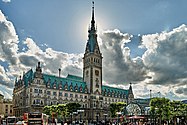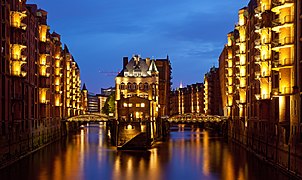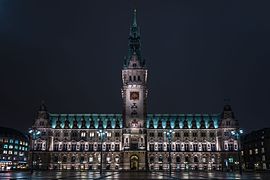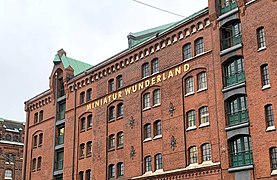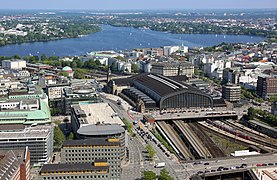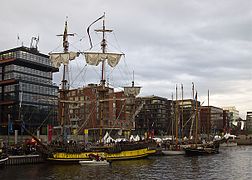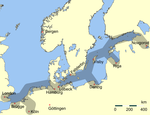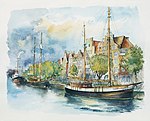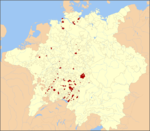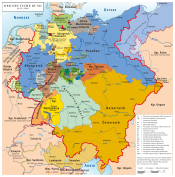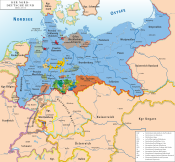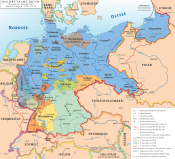Hamburg
Hamburg
Hamborg (Low German) | |
|---|---|
Municipality and state | |
| Free and Hanseatic City of Hamburg | |
| Coordinates: 53°33′N 10°00′E / 53.550°N 10.000°E | |
| Country | Germany |
| Government | |
| • Body | Hamburg Parliament |
| • First Mayor | Peter Tschentscher (SPD) |
| • Second Mayor | Katharina Fegebank |
| • Governing parties | SPD / Greens |
| • Bundesrat votes | 3 (of 69) |
| • Bundestag seats | 16 (of 736) |
| Area | |
| • City | 755.22 km2 (291.59 sq mi) |
| Population (2022-12-31)[2] | |
| • City | 1,945,532 |
| • Density | 2,600/km2 (6,700/sq mi) |
| • Urban | 2,484,800[1] |
| • Metro | 5,425,628 |
| Demonym(s) | German: Hamburger (male), Hamburgerin (female) English: Hamburger(s),[3] [4] Hamburgian(s) |
| GDP | |
| • Total | €144.220 billion (2022) |
| • Per capita | €76,910 (2022) |
| Time zone | UTC+1 (Central (CET)) |
| • Summer (DST) | UTC+2 (Central (CEST)) |
| Postal code(s) | 20001–21149, 22001–22769 |
| Area code(s) | 040 |
| ISO 3166 code | DE-HH |
| Vehicle registration |
|
| NUTS Region | DE6 |
| HDI (2021) | 0.972[6] very high · 1st of 16 |
| Website | hamburg.com |
Hamburg (German: [ˈhambʊʁk] ⓘ,[7] locally also [ˈhambʊɪ̯ç] ⓘ; Low Saxon: Hamborg [ˈhambɔːç] ⓘ), officially the Free and Hanseatic City of Hamburg,[8][9] is the second-largest city in Germany, after Berlin, and 8th-largest in the European Union, with a population of over 1.9 million.[10][1] The Hamburg Metropolitan Region has a population of over 5.1 million and is the ninth-biggest metropolitan region by GDP in the European Union.
At the southern tip of the Jutland Peninsula, Hamburg stands on the branching River Elbe at the head of a 110 km (68 mi) estuary to the North Sea, on the mouth of the Alster and Bille. Hamburg is one of Germany's three city-states alongside Berlin and Bremen, and is surrounded by Schleswig-Holstein to the north and Lower Saxony to the south. The Port of Hamburg is Germany's largest and Europe's third-largest, after Rotterdam and Antwerp. The local dialect is a variant of Low Saxon.
The official name reflects Hamburg's history as a member of the medieval Hanseatic League and a free imperial city of the Holy Roman Empire. Before the 1871 unification of Germany, it was a fully sovereign city state, and before 1919 formed a civic republic headed constitutionally by a class of hereditary Grand Burghers or Hanseaten. Beset by disasters such as the Great Fire of Hamburg, North Sea flood of 1962 and military conflicts including World War II bombing raids, the city has managed to recover and emerge wealthier after each catastrophe.
Major regional broadcaster NDR, the printing and publishing firm Gruner + Jahr and the newspapers Der Spiegel and Die Zeit are based in the city. Hamburg is the seat of Germany's oldest stock exchange and the world's oldest merchant bank, Berenberg Bank. Media, commercial, logistical, and industrial firms with significant locations in the city include multinationals Airbus, Blohm + Voss, Aurubis, Beiersdorf, Lufthansa and Unilever. Hamburg is also a major European science, research, and education hub, with several universities and institutions, including the Deutsches Elektronen-Synchrotron Laboratory DESY. The city enjoys a very high quality of living, being ranked 19th in the 2019 Mercer Quality of Living Survey.[11]
Hamburg hosts specialists in world economics and international law, including consular and diplomatic missions as the International Tribunal for the Law of the Sea, the EU-LAC Foundation, and the UNESCO Institute for Lifelong Learning, multipartite international political conferences and summits such as Europe and China and the G20. Former German chancellors Helmut Schmidt and Angela Merkel were both born in Hamburg. The former Mayor of Hamburg, Olaf Scholz, has been the current German chancellor since December 2021.
Hamburg is a major international and domestic tourist destination. The Speicherstadt and Kontorhausviertel were declared World Heritage Sites by UNESCO in 2015.[12] Hamburg's rivers and canals are crossed by around 2,500 bridges, making it the city with the highest number of bridges in Europe,[13] and with 5 of the world's 29 tallest churches standing in Hamburg, it is also the city with the highest number of churches surpassing 100 metres (330 ft) worldwide. Aside from its rich architectural heritage, the city is also home to notable cultural venues such as the Elbphilharmonie and Laeiszhalle concert halls. It gave birth to movements like Hamburger Schule and paved the way for bands including the Beatles. Hamburg is also known for several theatres and a variety of musical shows. St. Pauli's Reeperbahn is among the best-known European entertainment districts.
History[edit]
Origins[edit]
Claudius Ptolemy (2nd century AD) reported the first name for the vicinity as Treva.[14]
Etymology[edit]
The name Hamburg comes from the first permanent building on the site, a castle which the Emperor Charlemagne ordered constructed in AD 808. It rose on rocky terrain in a marsh between the River Alster and the River Elbe as a defence against Slavic incursion, and acquired the name Hammaburg, burg meaning castle or fort. The origin of the Hamma term remains uncertain,[15] but its location is estimated to be at the site of today's Domplatz.[16][17]
Medieval Hamburg[edit]

In 834, Hamburg was designated as the seat of a bishopric. The first bishop, Ansgar, became known as the Apostle of the North. Two years later, Hamburg was united with Bremen as the Bishopric of Hamburg-Bremen.[18]
Hamburg was destroyed and occupied several times. In 845, 600 Viking ships sailed up the River Elbe and destroyed Hamburg, at that time a town of around 500 inhabitants.[18] In 1030, King Mieszko II Lambert of Poland burned down the city. Valdemar II of Denmark raided and occupied Hamburg in 1201 and in 1214. The Black Death killed at least 60% of the population in 1350.[19] Hamburg experienced several great fires in the medieval period.[20]
In 1189, by imperial charter, Frederick I "Barbarossa" granted Hamburg the status of a Free Imperial City and tax-free access (or free-trade zone) up the Lower Elbe into the North Sea. In 1265, an allegedly forged letter was presented to or by the Rath of Hamburg.[21] This charter, along with Hamburg's proximity to the main trade routes of the North Sea and Baltic Sea, quickly made it a major port in Northern Europe. Its trade alliance with Lübeck in 1241 marks the origin and core of the powerful Hanseatic League of trading cities. On 8 November 1266, a contract between Henry III and Hamburg's traders allowed them to establish a hanse in London. This was the first time in history that the word hanse was used for the trading guild of the Hanseatic League.[22] In 1270, the solicitor of the senate of Hamburg, Jordan von Boitzenburg, wrote the first description of civil, criminal and procedural law for a city in Germany in the German language, the Ordeelbook (Ordeel: sentence).[23] On 10 August 1410, civil unrest forced a compromise (German: Rezeß, literally meaning: withdrawal). This is considered the first constitution of Hamburg.[24]
In 1356, the Matthiae-Mahl feast dinner for Hanseatic League cities was celebrated for the first time on 25 February, the first day of spring in medieval times. It continues today as the world's oldest ceremonial meal.[25]
Early modern period[edit]
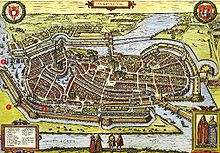
In 1529, the city embraced Lutheranism, and it received Reformed refugees from the Netherlands and France.
When Jan van Valckenborgh introduced a second layer to the fortifications to protect against the Thirty Years' War in the seventeenth century, he extended Hamburg and created a "New Town" (Neustadt) whose street names still date from the grid system of roads he introduced.[26]
Upon the dissolution of the Holy Roman Empire in 1806, the Free Imperial City of Hamburg was not incorporated into a larger administrative area while retaining special privileges (mediatised), but became a sovereign state with the official title of the Free and Hanseatic City of Hamburg. Hamburg was briefly annexed by Napoleon I to the First French Empire (1804–1814/1815). Russian forces under General Bennigsen finally freed the city in 1814. Hamburg re-assumed its pre-1811 status as a city-state in 1814. The Vienna Congress of 1815 confirmed Hamburg's independence and it became one of 39 sovereign states of the German Confederation (1815–1866).
In 1842, about a quarter of the inner city was destroyed in the "Great Fire". The fire started on the night of 4 May and was not extinguished until 8 May. It destroyed three churches, the town hall, and many other buildings, killing 51 people and leaving an estimated 20,000 homeless. Reconstruction took more than 40 years.

After periodic political unrest, particularly in 1848, Hamburg adopted in 1860 a semidemocratic constitution that provided for the election of the Senate, the governing body of the city-state, by adult taxpaying males. Other innovations included the separation of powers, the separation of Church and State, freedom of the press, of assembly and association. Hamburg became a member of the North German Confederation (1866–1871) and of the German Empire (1871–1918), and maintained its self-ruling status during the Weimar Republic (1919–1933). Hamburg acceded to the German Customs Union or Zollverein in 1888, the last (along with Bremen) of the German states to join. The city experienced its fastest growth during the second half of the 19th century when its population more than quadrupled to 800,000 as the growth of the city's Atlantic trade helped make it Europe's second-largest port.[27] The Hamburg-America Line, with Albert Ballin as its director, became the world's largest transatlantic shipping company around the start of the 20th century. Shipping companies sailing to South America, Africa, India and East Asia were based in the city. Hamburg was the departure port for many Germans and Eastern Europeans to emigrate to the United States in the late 19th and early 20th centuries. Trading communities from all over the world established themselves there.
A major outbreak of cholera in 1892 was badly handled by the city government, which retained an unusual degree of independence for a German city. About 8,600 died in the largest German epidemic of the late 19th century, and the last major cholera epidemic in a major city of the Western world.
Second World War[edit]
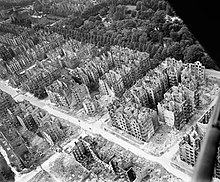
Hamburg was a Gau within the administrative division of Nazi Germany from 1934 until 1945. During the Second World War, the Allied bombing of Hamburg devastated much of the city and the harbour. On 23 July 1943, the Royal Air Force and United States Army Air Force firebombing created a firestorm which spread from the Hauptbahnhof (main railway station) and quickly moved south-east, completely destroying entire boroughs such as Hammerbrook, Billbrook and Hamm South. Thousands of people perished in these densely populated working class boroughs. The raids, codenamed Operation Gomorrah by the RAF, killed at least 42,600 civilians; the precise number is not known. About one million civilians were evacuated in the aftermath of the raids. While some of the boroughs destroyed were rebuilt as residential districts after the war, others such as Hammerbrook were entirely developed into office, retail and limited residential or industrial districts.
The Hamburg Commonwealth War Graves Commission Cemetery is in the greater Ohlsdorf Cemetery in the north of Hamburg.
At least 42,900 people are thought to have perished[29] in the Neuengamme concentration camp (about 25 km (16 mi) outside the city in the marshlands), mostly from epidemics and in the destruction of Kriegsmarine vessels housing evacuees at the end of the war.
Systematic deportations of Jewish Germans and Gentile Germans of Jewish descent started on 18 October 1941. These were all directed to ghettos in Nazi-occupied Europe or to concentration camps. Most deported persons perished in the Holocaust. By the end of 1942, the Jüdischer Religionsverband in Hamburg was dissolved as an independent legal entity and its remaining assets and staff were assumed by the Reich Association of Jews in Germany (District Northwest). On 10 June 1943, the Reich Security Main Office dissolved the association by a decree.[30] The few remaining employees not somewhat protected by a mixed marriage were deported from Hamburg on 23 June to Theresienstadt, where most of them perished.
Post-war history[edit]

The city was surrendered to British Forces on 3 May 1945, in the Battle of Hamburg,[31] three days after Adolf Hitler's death. After the Second World War, Hamburg formed part of the British Zone of Occupation; it became a state of West Germany in 1949.
On 16 February 1962, a North Sea flood caused the Elbe to rise to an all-time high, inundating one-fifth of Hamburg and killing more than 300 people.
The inner German border – only 50 kilometres (30 mi) east of Hamburg – separated the city from most of its hinterland and reduced Hamburg's global trade. Since German reunification in 1990, and the accession of several Central European and Baltic countries into the European Union in 2004, the Port of Hamburg has restarted ambitions for regaining its position as the region's largest deep-sea port for container shipping and its major commercial and trading centre.
Geography[edit]
Hamburg is at a sheltered natural harbour on the southern fanning-out of the Jutland Peninsula, between Continental Europe to the south and Scandinavia to the north, with the North Sea to the west and the Baltic Sea to the northeast. It is on the River Elbe at its confluence with the Alster and Bille. The city centre is around the Binnenalster ("Inner Alster") and Außenalster ("Outer Alster"), both formed by damming the River Alster to create lakes. The islands of Neuwerk, Scharhörn, and Nigehörn, 100 kilometres (60 mi) away in the Hamburg Wadden Sea National Park, are also part of the city of Hamburg.[32]
The neighbourhoods of Neuenfelde, Cranz, Francop and Finkenwerder are part of the Altes Land (old land) region, the largest contiguous fruit-producing region in Central Europe. Neugraben-Fischbek has Hamburg's highest elevation, the Hasselbrack at 116.2 metres (381 ft) AMSL.[33] Hamburg borders the states of Schleswig-Holstein and Lower Saxony.
Climate[edit]
Hamburg has an oceanic climate (Köppen: Cfb), influenced by its proximity to the coast and maritime influences that originate over the Atlantic Ocean. The location in the north of Germany provides extremes greater than typical marine climates, but definitely in the category due to the prevailing westerlies.[34] Nearby wetlands enjoy a maritime temperate climate. The amount of snowfall has varied greatly in recent decades. In the late 1970s and early 1980s, heavy snowfall sometimes occurred,[35] the winters of recent years have been less cold, with snowfall just a few days per year.[36][37]
The warmest months are June, July, and August, with high temperatures of 20.1 to 22.5 °C (68.2 to 72.5 °F). The coldest are December, January, and February, with low temperatures of −0.3 to 1.0 °C (31.5 to 33.8 °F).[38]
| Climate data for Hamburg-Fuhlsbuttel (Hamburg Airport), elevation: 15 m, 1991–2020 normals) | |||||||||||||
|---|---|---|---|---|---|---|---|---|---|---|---|---|---|
| Month | Jan | Feb | Mar | Apr | May | Jun | Jul | Aug | Sep | Oct | Nov | Dec | Year |
| Record high °C (°F) | 14.4 (57.9) |
17.2 (63.0) |
23.0 (73.4) |
29.7 (85.5) |
33.5 (92.3) |
34.6 (94.3) |
40.1 (104.2) |
37.3 (99.1) |
32.3 (90.1) |
26.1 (79.0) |
20.2 (68.4) |
15.7 (60.3) |
40.1 (104.2) |
| Mean daily maximum °C (°F) | 4.2 (39.6) |
5.2 (41.4) |
8.7 (47.7) |
13.9 (57.0) |
18.0 (64.4) |
20.9 (69.6) |
23.2 (73.8) |
23.0 (73.4) |
18.8 (65.8) |
13.6 (56.5) |
8.2 (46.8) |
5.0 (41.0) |
13.6 (56.5) |
| Daily mean °C (°F) | 2.1 (35.8) |
2.4 (36.3) |
4.9 (40.8) |
9.1 (48.4) |
13.0 (55.4) |
16.0 (60.8) |
18.3 (64.9) |
18.0 (64.4) |
14.4 (57.9) |
10.0 (50.0) |
5.7 (42.3) |
2.9 (37.2) |
9.7 (49.5) |
| Mean daily minimum °C (°F) | −0.5 (31.1) |
−0.5 (31.1) |
1.1 (34.0) |
4.0 (39.2) |
7.6 (45.7) |
10.8 (51.4) |
13.3 (55.9) |
13.1 (55.6) |
10.1 (50.2) |
6.3 (43.3) |
2.9 (37.2) |
0.4 (32.7) |
5.7 (42.3) |
| Record low °C (°F) | −22.8 (−9.0) |
−29.1 (−20.4) |
−15.3 (4.5) |
−7.1 (19.2) |
−5.0 (23.0) |
0.6 (33.1) |
3.4 (38.1) |
1.8 (35.2) |
−1.2 (29.8) |
−7.1 (19.2) |
−15.4 (4.3) |
−18.5 (−1.3) |
−29.1 (−20.4) |
| Average precipitation mm (inches) | 66.7 (2.63) |
54.9 (2.16) |
56.7 (2.23) |
39.2 (1.54) |
57.8 (2.28) |
74.4 (2.93) |
81.8 (3.22) |
77.5 (3.05) |
64.7 (2.55) |
63.0 (2.48) |
61.1 (2.41) |
72.6 (2.86) |
770.5 (30.33) |
| Average precipitation days (≥ 1.0 mm) | 17.7 | 16.2 | 15.2 | 12.8 | 13.8 | 15.3 | 16.0 | 15.8 | 14.5 | 16.2 | 16.9 | 18.0 | 188.4 |
| Average snowy days (≥ 1.0 cm) | 5.9 | 5.0 | 2.9 | 0 | 0 | 0 | 0 | 0 | 0 | 0 | 1.2 | 3.5 | 18.5 |
| Average relative humidity (%) | 85.8 | 82.6 | 77.7 | 71.0 | 70.8 | 72.1 | 72.6 | 74.3 | 79.4 | 83.4 | 87.1 | 87.6 | 78.7 |
| Mean monthly sunshine hours | 44.9 | 66.8 | 119.9 | 182.8 | 221.2 | 210.3 | 218.8 | 202.7 | 152.4 | 109.3 | 51.4 | 36.1 | 1,616.7 |
| Average ultraviolet index | 0 | 1 | 2 | 4 | 5 | 6 | 6 | 5 | 4 | 2 | 1 | 0 | 3 |
| Source 1: World Meteorological Organization[39] | |||||||||||||
| Source 2: DWD[40] and Weather Atlas[41] | |||||||||||||
Demographics[edit]

| Year | Pop. | ±% |
|---|---|---|
| 950 | 500 | — |
| 1430 | 16,000 | +3100.0% |
| 1840 | 136,956 | +756.0% |
| 1900 | 705,738 | +415.3% |
| 1910 | 931,035 | +31.9% |
| 1920 | 1,026,989 | +10.3% |
| 1930 | 1,145,124 | +11.5% |
| 1940 | 1,725,500 | +50.7% |
| 1945 | 1,350,278 | −21.7% |
| 1950 | 1,605,606 | +18.9% |
| 1961 | 1,840,543 | +14.6% |
| 1970 | 1,793,640 | −2.5% |
| 1975 | 1,717,383 | −4.3% |
| 1980 | 1,645,095 | −4.2% |
| 1985 | 1,579,884 | −4.0% |
| 1990 | 1,652,363 | +4.6% |
| 2000 | 1,715,392 | +3.8% |
| 2010 | 1,786,448 | +4.1% |
| 2012 | 1,734,272 | −2.9% |
| 2013 | 1,746,342 | +0.7% |
| 2014 | 1,762,791 | +0.9% |
| 2015 | 1,787,408 | +1.4% |
| 2016 | 1,810,438 | +1.3% |
| 2018 | 1,841,179 | +1.7% |
| 2020 | 1,852,478 | +0.6% |
| Population size may be affected by changes in administrative divisions. | ||
| Largest groups of foreign residents[42] | |
| Nationality | Population (31 December 2022) |
|---|---|
| 44,280 | |
| 33,570 | |
| 24,635 | |
| 23,310 | |
| 17,725 | |
| 11,465 | |
| 10,510 | |
| 9,725 | |
| 9,375 | |
| 8,830 | |
| 7,770 | |
| 7,570 | |
| 7,550 | |
| 7,405 | |
| 6,685 | |
| 6,420 | |
| 6,235 | |
| 6,095 | |
| 6,040 | |
| 5,400 | |
On 31 December 2016, there were 1,860,759 people registered as living in Hamburg in an area of 755.3 km2 (291.6 sq mi). The population density was 2,464/km2 (6,380/sq mi).[43] The metropolitan area of the Hamburg region (Hamburg Metropolitan Region) is home to 5,107,429 living on 196/km2 (510/sq mi).[44]
There were 915,319 women and 945,440 men in Hamburg. For every 1,000 females, there were 1,033 males. In 2015, there were 19,768 births in Hamburg (of which 38.3% were to unmarried women); 6422 marriages and 3190 divorces, and 17,565 deaths. In the city, the population was spread out, with 16.1% under the age of 18, and 18.3% were 65 years of age or older. 356 people in Hamburg were over the age of 100.[45]
According to the Statistical Office for Hamburg and Schleswig-Holstein, the number of people with a migrant background is at 34% (631,246).[46] Immigrants come from 200 countries. 5,891 people have acquired German cititzenship in 2016.[47]
In 2016, there were 1,021,666 households, of which 17.8% had children under the age of 18; 54.4% of all households were made up of singles. 25.6% of all households were single parent households. The average household size was 1.8.[48]
Portuguese community[edit]
Hamburg has the largest Portuguese community in Germany with about 30,000 people with Portuguese diaspora. Many Portuguese sailors and merchants came to Hamburg since the 15th century due to its port. Since 1970s, there is a district in Hamburg called Portugiesenviertel (Portuguese quarter) where many Portuguese people settled there and has many Portuguese restaurants, cafes and shops today which attracts many tourists. There are many statues, squares and streets in Hamburg that are named after Portuguese historical figures including the Vasco da Gama statue on the Kornhaus bridge, which was suggested by Portuguese community to make the Portuguese community in Hamburg visible.[49]
Afghan community[edit]
Hamburg has a large Afghan community with about 50,000 people of Afghan diaspora, which makes Hamburg not only the largest Afghan community in Germany, but also in Europe. They first came to Hamburg in the 1970s before expanding during the Afghan conflict in the 1980s and 1990s where many Afghan migrants chose to live in Hamburg.[50] After 2015 the Afghan population almost doubled due to a new influx from the migrant crisis. There is an area in Hamburg behind the central station where many Afghan restaurants and shops are located. Many carpet businesses in Speicherstadt are operated by Afghan traders,[51] with Hamburg still a global leader in the trade of oriental rugs.[52]
Foreign citizens in Hamburg[edit]
Hamburg residents with a foreign citizenship as of 31 December 2016 is as follows:[47]
| Citizenship | Number | % |
|---|---|---|
| Total | 288,338 | 100% |
| Europe | 193,812 | 67.2% |
| European Union | 109,496 | 38% |
| Asian | 59,292 | 20.6% |
| African | 18,996 | 6.6% |
| North and South American | 11,315 | 3.9% |
| Australian and Oceanian | 1,234 | 0.4% |
Language[edit]
As elsewhere in Germany, Standard German is spoken in Hamburg, but as typical for northern Germany, the original language of Hamburg is Low German, usually referred to as Hamborger Platt (German Hamburger Platt) or Hamborgsch. Since large-scale standardisation of the German language beginning in earnest in the 18th century, various Low German-coloured dialects have developed (contact-varieties of German on Low Saxon substrates). Originally, there was a range of such Missingsch varieties, the best-known being the low-prestige ones of the working classes and the somewhat more bourgeois Hanseatendeutsch (Hanseatic German), although the term is used in appreciation.[53] All of these are now moribund due to the influences of Standard German used by education and media. However, the former importance of Low German is indicated by several songs, such as the sea shanty Hamborger Veermaster, written in the 19th century when Low German was used more frequently. Many toponyms and street names reflect Low Saxon vocabulary, partially even in Low Saxon spelling, which is not standardised, and to some part in forms adapted to Standard German.[54]
Religion[edit]
65.2% of the population is not religious or adherent other religions than the Evangelical Church or Catholicism.[55]
In 2018, 24.9% of the population belonged to the North Elbian Evangelical Lutheran Church, the largest religious body, and 9.9% to the Roman Catholic Church. Hamburg is seat of one of the three bishops of the Evangelical Lutheran Church in Northern Germany and seat of the Roman Catholic Archdiocese of Hamburg.
According to the publication Muslimisches Leben in Deutschland ("Muslim life in Germany"), an estimated 141,900 Muslim migrants (from nearly 50 countries of origin) lived in Hamburg in 2008.[56] About three years later (May 2011) calculations based on census data for 21 countries of origin resulted in a figure of about 143,200 Muslim migrants in Hamburg, making up 8.4% percent of the population.[57] As of 2021[update], there were more than 50 mosques in the city,[58] including the Ahmadiyya run Fazle Omar Mosque, which is the oldest in the city,[59] and which hosts the Islamic Centre Hamburg.
A Jewish community also exists.[60] As of 2022, around 2,500 Jews live in Hamburg.[61]
Government[edit]

The city of Hamburg is one of 16 German states, therefore the Mayor of Hamburg's office corresponds more to the role of a minister-president than to the one of a city mayor. As a German state government, it is responsible for public education, correctional institutions and public safety; as a municipality, it is additionally responsible for libraries, recreational facilities, sanitation, water supply and welfare services.
Since 1897, the seat of the government has been Hamburg City Hall (Hamburg Rathaus), with the office of the mayor, the meeting room for the Senate and the floor for the Hamburg Parliament.[62] From 2001 until 2010, the mayor of Hamburg was Ole von Beust,[63] who governed in Germany's first statewide "black-green" coalition, consisting of the conservative CDU Hamburg and the alternative GAL, which are Hamburg's regional wing of the Alliance 90/The Greens party.[64] Von Beust was briefly succeeded by Christoph Ahlhaus in 2010, but the coalition broke apart on 28 November 2010.[65] On 7 March 2011 Olaf Scholz (SPD) became mayor. After the 2015 election the SPD and the Alliance 90/The Greens formed a coalition.
Boroughs[edit]

Hamburg is made up of seven boroughs (German: Bezirke) and subdivided into 104 quarters (German: Stadtteile). There are 181 localities (German: Ortsteile). The urban organisation is regulated by the Constitution of Hamburg and several laws.[9][66] Most of the quarters were former independent cities, towns or villages annexed into Hamburg proper. The last large annexation was done through the Greater Hamburg Act of 1937, when the cities Altona, Harburg, and Wandsbek were merged into the state of Hamburg.[67] The Act of the Constitution and Administration of Hanseatic city of Hamburg established Hamburg as a state and a municipality.[68] Some of the boroughs and quarters have been rearranged several times.
Each borough is governed by a Borough Council (German: Bezirksversammlung) and administered by a Municipal Administrator (German: Bezirksamtsleiter). The boroughs are not independent municipalities: their power is limited and subordinate to the Senate of Hamburg. The borough administrator is elected by the Borough Council and thereafter requires confirmation and appointment by Hamburg's Senate.[66] The quarters have no governing bodies of their own.

Since the latest territorial reform of March 2008, the boroughs are Hamburg-Mitte, Altona, Eimsbüttel, Hamburg-Nord, Wandsbek, Bergedorf, and Harburg.[69][70]
Hamburg-Mitte ("Hamburg Centre") covers mostly the urban centre of the city and consists of the quarters Billbrook, Billstedt, Borgfelde, Finkenwerder, HafenCity, Hamm, Hammerbrook, Horn, Kleiner Grasbrook, Neuwerk, Rothenburgsort, St. Georg, St. Pauli, Steinwerder, Veddel, Waltershof, and Wilhelmsburg.[69] The quarters Hamburg-Altstadt ("old town") and Neustadt ("new town") are the historical origin of Hamburg.
Altona is the westernmost urban borough, on the right bank of the Elbe river. From 1640 to 1864, Altona was under the administration of the Danish monarchy. Altona was an independent city until 1937. Politically, the following quarters are part of Altona: Altona-Altstadt, Altona-Nord, Bahrenfeld, Ottensen, Othmarschen, Groß Flottbek, Osdorf, Lurup, Nienstedten, Blankenese, Iserbrook, Sülldorf, Rissen, and Sternschanze.[69]
Bergedorf consists of the quarters Allermöhe, Altengamme, Bergedorf—the centre of the former independent town, Billwerder, Curslack, Kirchwerder, Lohbrügge, Moorfleet, Neuengamme, Neuallermöhe, Ochsenwerder, Reitbrook, Spadenland, and Tatenberg.[69]
Eimsbüttel is split into nine-quarters: Eidelstedt, Eimsbüttel, Harvestehude, Hoheluft-West, Lokstedt, Niendorf, Rotherbaum, Schnelsen, and Stellingen.[69] Located within this borough is former Jewish neighbourhood Grindel.
Hamburg-Nord contains the quarters Alsterdorf, Barmbek-Nord, Barmbek-Süd, Dulsberg, Eppendorf, Fuhlsbüttel, Groß Borstel, Hoheluft-Ost, Hohenfelde, Langenhorn, Ohlsdorf with Ohlsdorf cemetery, Uhlenhorst, and Winterhude.[69]
Harburg is situated on the southern shores of the river Elbe and covers parts of the port of Hamburg, residential and rural areas, and some research institutes. The quarters are Altenwerder, Cranz, Eißendorf, Francop, Gut Moor, Harburg, Hausbruch, Heimfeld, Langenbek, Marmstorf, Moorburg, Neuenfelde, Neugraben-Fischbek, Neuland, Rönneburg, Sinstorf, and Wilstorf.[69]
Wandsbek is divided into the quarters Bergstedt, Bramfeld, Duvenstedt, Eilbek, Farmsen-Berne, Hummelsbüttel, Jenfeld, Lemsahl-Mellingstedt, Marienthal, Poppenbüttel, Rahlstedt, Sasel, Steilshoop, Tonndorf, Volksdorf, Wandsbek, Wellingsbüttel, and Wohldorf-Ohlstedt.[69]
Cityscape[edit]
Architecture[edit]


Hamburg has architecturally significant buildings in a wide range of styles and just one skyscraper under construction (see List of tallest buildings in Hamburg). Churches are important landmarks, such as St Nicholas', which for a short time in the 19th century was the world's tallest building. The skyline features the tall spires of the most important churches (Hauptkirchen) St Michael's (nicknamed "Michel"), St Peter's, St James's (St. Jacobi), and St. Catherine's covered with copper plates, and the Heinrich-Hertz-Turm, the radio and television tower (no longer publicly accessible).
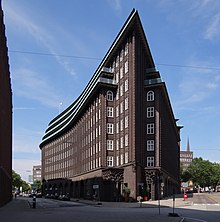
The many streams, rivers, and canals are crossed by some 2,500 bridges, more than London, Amsterdam, and Venice put together.[71] Hamburg has more bridges inside its city limits than any other city in the world.[72] The Köhlbrandbrücke, Freihafen Elbbrücken, Lombardsbrücke, and Kennedybrücke dividing Binnenalster from Aussenalster are important roadways.
The town hall is a richly decorated Neo-Renaissance building finished in 1897. The tower is 112 metres (367 ft) high. Its façade, 111 m (364 ft) long, depicts the emperors of the Holy Roman Empire, since Hamburg was, as a Free Imperial City, only under the sovereignty of the emperor.[73] The Chilehaus, a brick expressionist office building built in 1922 and designed by architect Fritz Höger, is shaped like an ocean liner.
Europe's largest urban development since 2008, the HafenCity, will house about 15,000 inhabitants and 45,000 workers.[74] The plan includes designs by Rem Koolhaas and Renzo Piano. The Elbphilharmonie (Elbe Philharmonic Hall), opened in January 2017, houses concerts in a sail-shaped building on top of an old warehouse, designed by architects Herzog & de Meuron.[75][76]
The many parks are distributed over the whole city, which makes Hamburg a very verdant city. The biggest parks are the Stadtpark, the Ohlsdorf Cemetery, and Planten un Blomen. The Stadtpark, Hamburg's "Central Park", has a great lawn and a huge water tower, which houses one of Europe's biggest planetaria. The park and its buildings were designed by Fritz Schumacher in the 1910s.
Parks and gardens[edit]

The lavish and spacious Planten un Blomen park (Low German dialect for "plants and flowers") located in the centre of Hamburg is the green heart of the city. Within the park are various thematic gardens, the biggest Japanese garden in Germany, and the Alter Botanischer Garten Hamburg, which is a historic botanical garden that now consists primarily of greenhouses.
The Botanischer Garten Hamburg is a modern botanical garden maintained by the University of Hamburg. Besides these, there are many more parks of various sizes. In 2014 Hamburg celebrated a birthday of park culture, where many parks were reconstructed and cleaned up. Moreover, every year there are water-light-concerts in the Planten un Blomen park, from May to early October.
Culture[edit]

From the 1760s the theatre director Abel Seyler—the leader of the Hamburg National Theatre and subsequently the Seyler Theatre Company—established Hamburg as one of the leading European centres of theatrical innovation, promoting experimental productions and pioneering a new more realist style of acting, introducing Shakespeare to a German language audience, and promoting the concept of a national theatre in the tradition of Ludvig Holberg, the Sturm und Drang playwrights, and serious German opera.[77]
Today Hamburg has more than 40 theatres, 60 museums, and 100 music venues and clubs. With 6.6 music venues per 100,000 inhabitants, Hamburg has the second-highest density of music venues of Germany's largest cities, after Munich and ahead of Cologne and Berlin.[78][79] In 2005, more than 18 million people visited concerts, exhibitions, theatres, cinemas, museums, and cultural events, and 8,552 taxable companies (average size 3.16 employees) were engaged in the culture sector, which includes music, performing arts, and literature.[80] The creative industries represent almost one fifth of all companies in Hamburg.[81] Hamburg has entered the European Green Capital Award scheme, and was awarded the title of European Green Capital for 2011.
Theatres[edit]

Theatres in the city include the state-owned Deutsches Schauspielhaus, the Thalia Theatre, Ohnsorg Theatre, "Schmidts Tivoli", and the Kampnagel.[82]
The English Theatre of Hamburg, near the U3 station Mundsburg, was founded in 1976 and is the oldest professional English-language theatre in Germany, with exclusively English-speaking actors in its company.
Museums[edit]
Hamburg has several large museums and galleries showing classical and contemporary art, for example the Kunsthalle Hamburg with its contemporary art gallery (Galerie der Gegenwart), the Museum für Kunst und Gewerbe (Museum of Art and Design), and the Deichtorhallen (with the House of Photography and Hall of Contemporary Art). The Internationales Maritimes Museum Hamburg opened in the HafenCity quarter in 2008. There are various specialised museums in Hamburg, such as the Archäologisches Museum Hamburg (Hamburg Archaeological Museum) in the Harburg borough, the Hamburg Museum of Work (Museum der Arbeit), and several museums of local history, such as the Kiekeberg Open Air Museum (Freilichtmuseum am Kiekeberg) at Kiekeberg in the Harburg Hills, just outside of Hamburg, in Rosengarten. Two museum ships near St. Pauli Piers (Landungsbrücken) bear witness to the freight ship (Cap San Diego) and cargo sailing ship era (Rickmer Rickmers).[83] In 2017 the Hamburg-built iron-hulled sailing ship Peking returned to the city and was installed in the German Port Museum in 2020. The world's largest model railway museum, Miniatur Wunderland, with 15.4 km (9.57 mi) total railway length, is also situated near St. Pauli Piers in a former warehouse.
BallinStadt, a memorial park and former emigration station, is dedicated to the millions of Europeans who emigrated to North and South America between 1850 and 1939. Visitors descending from those overseas emigrants may search for their ancestors at computer terminals.
Music[edit]
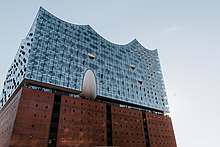
Hamburg State Opera is a leading opera company. Its orchestra is the Philharmoniker Hamburg. The city's other major orchestra is the NDR Elbphilharmonie Orchestra. The main concert venue is the new concert hall Elbphilharmonie. Before it was the Laeiszhalle, Musikhalle Hamburg. The Laeiszhalle also houses a third orchestra, the Hamburger Symphoniker. György Ligeti and Alfred Schnittke taught at the Hochschule für Musik und Theater Hamburg.[84][85]
Hamburg is the birthplace of Johannes Brahms, who spent his formative early years in the city, and the birthplace and home of waltz composer Oscar Fetrás, who wrote the "Mondnacht auf der Alster" waltz.
Since the German premiere of Cats in 1986, there have always been musicals running, including The Phantom of the Opera, The Lion King, Dirty Dancing, and Dance of the Vampires (musical). This density, the highest in Germany, is partly due to the major musical production company Stage Entertainment being based in the city.
In addition to musicals, opera houses, concert halls, and theatres, the cityscape is characterised by a large music scene. This includes, among other things, over 100 music venues, several annual festivals and over 50 event organisers based in Hamburg.[86] Larger venues include the Barclaycard Arena, the Bahrenfeld harness racing track, and Hamburg City Park.
Hamburg was an important centre of rock music in the early 1960s. The Beatles lived and played in Hamburg from August 1960 to December 1962. They proved popular and gained local acclaim. Prior to the group's initial recording and widespread fame, Hamburg provided residency and performing venues for the band during the time they performed there. One of the venues they performed at was the Star Club on St. Pauli.
Pop musicians from Hamburg include Udo Lindenberg, Deichkind, and Jan Delay. The singer Annett Louisan lives in the city.[citation needed]
An important meeting place for Hamburg musicians from the 1970s to the mid-80s was the jazz pub Onkel Pö, which was originally founded in the Pöseldorf neighbourhood and later moved to Eppendorf. Many musicians who were counted as part of the "Hamburg scene [de]" met here. In addition to Udo Lindenberg, these included Otto Waalkes, Hans Scheibner and groups such as Torfrock and Frumpy. One of the members of the band Frumpy was the Hamburg-born singer and composer Inga Rumpf.
Hamburg is the origin of the "Hamburger Schule", a term used for alternative music bands like Tocotronic, Blumfeld, Tomte or Kante. The meeting point of the Hamburg School was long considered to be the Golden Pudel Club [de] in Altona's old town, near the Fischmarkt. Alongside clubs such as the Pal, the Moondoo or the Waagenbau, today the Pudel is a central location of the Hamburg electro scene. Artists of this scene include the DJ duo Moonbootica, Mladen Solomun, and Helena Hauff.[87]
Hamburg is also home to many music labels, music distributors and publishers. These include Warner Music, Kontor Records, PIAS, Edel SE & Co. KGaA, Believe Digital, and Indigo. The high proportion of independent labels in the city, which include Audiolith, Dial Records, Grand Hotel van Cleef, among others, is striking. Before its closure, the label L'Âge d'or also belonged to these.
In addition, Hamburg has a considerable alternative and punk scene, which gathers around the Rote Flora, a squatted former theatre located in the Sternschanze.
The city was a major centre for heavy metal music in the 1980s. Helloween, Gamma Ray, Running Wild, and Grave Digger started in Hamburg.[88] The industrial rock band KMFDM was also formed in Hamburg, initially as a performance art project. The influences of these and other bands from the area helped establish the subgenre of power metal.
In the late 1990s, Hamburg was considered one of the strongholds of the German hip-hop scene. Bands like Beginner shaped the city's hip-hop style and made it a serious location for the hip-hop scene through songs like "Hamburg City Blues". In addition to Beginner, German hip-hop acts from Hamburg include Fünf Sterne Deluxe, Samy Deluxe, Fettes Brot, and 187 Strassenbande.[89]
Hamburg has a vibrant psychedelic trance community, with record labels such as Spirit Zone.[90]
Festivals and regular events[edit]

Hamburg is noted for several festivals and regular events. Some of them are street festivals, such as the LGBT pride Hamburg Pride festival[91] or the Alster fair (German: Alstervergnügen),[92] held at the Binnenalster. The Hamburger DOM is northern Germany's biggest funfair, held three times a year.[93] Hafengeburtstag is a funfair to honour the birthday of the port of Hamburg with a party and a ship parade.[94] The annual biker's service in Saint Michael's Church attracts tens of thousands of bikers.[95] Christmas markets in December are held at the Hamburg Rathaus square, among other places.[96] The long night of museums (German: Lange Nacht der Museen) offers one entrance fee for about 40 museums until midnight.[97] The sixth Festival of Cultures was held in September 2008, celebrating multi-cultural life.[98] The Filmfest Hamburg — a film festival originating from the 1950s Film Days (German: Film Tage) — presents a wide range of films.[99] The Hamburg Messe and Congress offers a venue for trade shows, such hanseboot, an international boat show, or Du und deine Welt, a large consumer products show.[100] Regular sports events—some open to pro and amateur participants—are the cycling competition EuroEyes Cyclassics, the Hamburg Marathon, the biggest marathon in Germany after Berlin,[101] the tennis tournament Hamburg Masters, and equestrian events like the Deutsches Derby.
Hamburg is also known for its music and festival culture. For example, the Reeperbahn alone has between 25 and 30 million visitors every year. In addition, there are over a million visitors to the annual festivals and major music events.[102] Hamburg's festivals include the Elbjazz Festival Archived 20 April 2021 at the Wayback Machine, which takes place 2 days a year (usually on the Whitsun weekend) in Hamburg's harbour and HafenCity.

For contemporary and experimental music, the "blurred edges Archived 20 April 2021 at the Wayback Machine" festival usually follows in May at various venues within Hamburg. In mid-August, the MS Dockville music and arts festival has run annually since 2007 in the Wilhelmsburg district.[103] This is followed at the end of September by the Reeperbahn Festival [de], which has been running since 2006. As Europe's largest club festival, it offers several hundred program points around the Reeperbahn in Hamburg over four days and is one of the most important meeting places for the music industry worldwide.[104] In November, the ÜBERJAZZ Festival, which aims to expand the stylistic boundaries of the concept of jazz, starts every year at Kampnagel.[105]
Cuisine[edit]

Original Hamburg dishes are Birnen, Bohnen und Speck (green beans cooked with pears and bacon).[106] Aalsuppe (Hamburgisch Oolsupp) is often mistaken to be German for "eel soup" (Aal/Ool translated 'eel'), but the name probably comes from the Low Saxon allns [aˑlns], meaning "all", "everything and the kitchen sink", not necessarily eel. Today eel is often included to meet the expectations of unsuspecting diners.[107] There is Bratkartoffeln (pan-fried potato slices), Finkenwerder Scholle (Low Saxon Finkwarder Scholl, pan-fried plaice), Pannfisch (pan-fried fish with mustard sauce),[108] Rote Grütze (Low Saxon Rode Grütt, related to Danish rødgrød, a type of summer pudding made mostly from berries and usually served with cream, like Danish rødgrød med fløde),[109] and Labskaus (a mixture of corned beef, mashed potatoes, and beetroot, a cousin of the Norwegian lapskaus and Liverpool's lobscouse, all offshoots off an old-time one-pot meal that used to be the main component of the common sailor's humdrum diet on the high seas).[110]
Alsterwasser (in reference to the city's river, the Alster) is the local name for a type of shandy, a concoction of equal parts of beer and carbonated lemonade (Zitronenlimonade), the lemonade being added to the beer.[111]
A regional dessert pastry called "Franzbrötchen" is similar in preparation to a croissant, but includes a cinnamon and sugar filling, often with raisins or brown sugar streusel. Ordinary bread rolls tend to be oval-shaped and of the French bread variety. The local name is Schrippe (scored lengthways) for the oval kind and, for the round kind, Rundstück ("round piece" rather than mainstream German Brötchen, diminutive form of Brot "bread"),[112] a relative of Denmark's rundstykke. The cuisines of Hamburg and Denmark, especially of Copenhagen, have a lot in common. This also includes a predilection for open-faced sandwiches of all sorts, especially topped with cold-smoked or pickled fish.[citation needed]
The American hamburger may have developed from Hamburg's Frikadeller: a pan-fried patty (usually larger and thicker than its American counterpart) made from a mixture of ground beef, soaked stale bread, egg, chopped onion, salt, and pepper, usually served with potatoes and vegetables like any other piece of meat, not usually on a bun. The Oxford Dictionary defined a Hamburger steak in 1802: a sometimes-smoked and -salted piece of meat, that, according to some sources, came from Hamburg to America.[113] The name and food, "hamburger", has entered all English-speaking countries, and derivative words in non-English speaking countries.
There are restaurants which offer most of these dishes, especially in the HafenCity.
Main sights[edit]
-
Elbphilharmonie ("Elphi")
-
Speicherstadt (Warehouse district)
-
St. Michael's Church ("Michel")
-
Reeperbahn, nightlife district of St. Pauli
-
Miniatur Wunderland (Miniature Wonderland)
-
Große Freiheit ("Great Freedom")
-
Dockland at night
-
Jungfernstieg Boulevard
-
Hills and mansions in Blankenese
-
Laeiszhalle concert venue
-
Hamburg Hauptbahnhof, the busiest railway station in Germany
-
Hanseatisches Oberlandesgericht ("HansOLG"), upper court
-
Highrises in St. Pauli (Hafenkrone)
-
Traditional sailing ships at Sandtorkai in HafenCity
-
View over Hamburg and the Alster

Alternative culture[edit]
Hamburg has long been a centre of alternative music and counter-culture movements. The boroughs of St. Pauli, Sternschanze, and Altona are known for being home to many radical left-wing and anarchist groups, culminating every year during the traditional May Day demonstrations.[114]
During the 2017 G20 summit, which took place in Hamburg from 7–8 July that year, protestors clashed violently with the police in the Sternschanze area and particularly around the Rote Flora. On 7 July, several cars were set on fire and street barricades were erected to prevent the police from entering the area. In response to that, the police made heavy use of water cannons and tear gas in order to scatter the protestors. However, this was met with strong resistance by protestors, resulting in a total of 160 injured police and 75 arrested participants in the protests.[115]
After the summit, however, the Rote Flora issued a statement, in which it condemns the arbitrary acts of violence that were committed by some of the protestors whilst generally defending the right to use violence as a means of self-defence against police oppression. In particular, the spokesperson of the Rote Flora said that the autonomous cultural centre had a traditionally good relationship with its neighbours and local residents, since they were united in their fight against gentrification in that neighbourhood.[116]
British, American and English-speaking culture[edit]

There are several English-speaking communities, such as the Caledonian Society of Hamburg, The British Club Hamburg, British and Commonwealth Luncheon Club, Anglo-German Club e.V.,[117] Professional Women's Forum,[118] The British Decorative and Fine Arts Society, The English Speaking Union of the Commonwealth, The Scottish Country Dancers of Hamburg, The Hamburg Players e.V. English Language Theatre Group, The Hamburg Exiles Rugby Club, several cricket clubs, and The Morris Minor Register of Hamburg. Furthermore, the Anglo-Hanseatic Lodge No. 850[119] within the Grand Lodge of British Freemasons of Germany[120] under the United Grand Lodges of Germany[121] works in Hamburg, and has a diverse expat membership. There is also a 400-year-old Anglican church community worshipping at St Thomas Becket Church [de].[122]
American and international English-speaking organisations include The American Club of Hamburg e.V.,[123] the American Women's Club of Hamburg,[124] the English Speaking Union, the German-American Women's Club,[125] and The International Women's Club of Hamburg e.V. The American Chamber of Commerce handles matters related to business affairs.[126] The International School of Hamburg serves school children.
William Wordsworth, Dorothy Wordsworth, and Samuel Taylor Coleridge spent the last two weeks of September 1798 at Hamburg. Dorothy wrote a detailed journal of their stay, labelled "The Hamburg Journal (1798) by noted Wordsworth scholar Edward de Selincourt".[127]
A Hamburg saying, referring to its anglophile nature, is: "Wenn es in London anfängt zu regnen, spannen die Hamburger den Schirm auf". ... "When it starts raining in London, people in Hamburg open their umbrellas".
Memorials[edit]
A memorial for English engineer William Lindley,[128] who, beginning in 1842, reorganised the drinking water and sewerage system and thus helped to fight against cholera, is near Baumwall railway station in Vorsetzen street.
In 2009, more than 2,500 "stumbling blocks" (Stolpersteine) were laid, engraved with the names of deported and murdered citizens. Inserted into the pavement in front of their former houses, the blocks draw attention to the victims of Nazi persecution.[129]
Economy[edit]
The gross domestic product (GDP) of Hamburg was 119.0 billion € in 2018, accounting for 3.6% of German economic output. GDP per capita adjusted for purchasing power was €59,600 or 197% of the EU27 average in the same year. The GDP per employee was 132% of the EU average.[130] The city has a relatively high employment rate, at 88 percent of the working-age population, employed in over 160,000 businesses. The median gross salary in 2021 was €47,544, which is 9.29% higher than the median gross salary in Germany overall.[131]
The unemployment rate stood at 6.1% in October 2018 and was higher than the German average.[132]
| Year[133] | 2000 | 2001 | 2002 | 2003 | 2004 | 2005 | 2006 | 2007 | 2008 | 2009 | 2010 | 2011 | 2012 | 2013 | 2014 | 2015 | 2016 | 2017 | 2018 | 2019 |
|---|---|---|---|---|---|---|---|---|---|---|---|---|---|---|---|---|---|---|---|---|
| Unemployment rate in % | 8.9 | 8.3 | 9.0 | 9.9 | 9.7 | 11.3 | 11.0 | 9.1 | 8.1 | 8.6 | 8.2 | 7.8 | 7.5 | 7.4 | 7.6 | 7.4 | 7.1 | 6.8 | 6.3 | 6.1 |
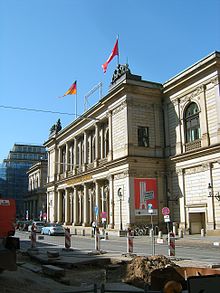
Banking[edit]
Hamburg has for centuries been a commercial centre of Northern Europe, and is the most important banking city of Northern Germany. The city is the seat of Germany's oldest bank, the Berenberg Bank, M.M.Warburg & CO, and Hamburg Commercial Bank. The Hamburg Stock Exchange is the oldest of its kind in Germany.
Port[edit]
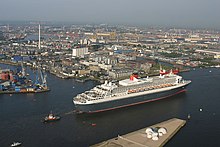
The most significant economic unit is the Port of Hamburg, which ranks third to Rotterdam and Antwerpen in Europe and 17th-largest worldwide, with transshipments of 8.9 million twenty-foot equivalent units (TEU) of cargo and 138.2 million tons of goods in 2016.[134] International trade is also the reason for the large number of consulates in the city. Although situated 110 kilometres (70 mi) up the Elbe, it is considered a sea port due to its ability to handle large ocean-going vessels.[135]
Industrial production[edit]
Heavy industry of Hamburg includes the making of steel, aluminium, copper and various large shipyards such as Blohm + Voss.[136]
Hamburg, along with Seattle and Toulouse, is an important location of the civil aerospace industry. Airbus, which operates the Hamburg-Finkenwerder assembly plant in Finkenwerder, employs over 13,000 people.[137]
HafenCity[edit]

The HafenCity is Europe's largest urban development project and is located in the Hamburg-Mitte district. It consists of the area of the Great Grasbrook, the northern part of the former Elbe island Grasbrook, and the warehouse district on the former Elbe island Kehrwieder and Wandrahm. It is bordered to the north, separated by the customs channel to Hamburg's city centre, west and south by the Elbe, and to the east, bounded by the upper harbour, Rothenburgsort. The district is full of rivers and streams and is surrounded by channels, and has a total area of about 2.2 square-kilometres.
HafenCity has 155 hectares in the area formerly belonging to the free port north of the Great Grasbrook. Residential units for up to 12,000 people are planned to be built on the site by around the mid-2020s, and jobs for up to 40,000 people, mainly in the office sector, should be created. It is the largest ongoing urban development project in Hamburg.
Construction work started in 2003, and in 2009 the first part of the urban development project was finished with the completion of the Dalmannkai / Sandtorkai neighbourhood – which is the first stage of the HafenCity project. According to the person responsible for the development and commercialisation of HafenCity, HafenCity Hamburg GmbH, half of the master plan underlying structural construction is already completed, whereas the other half is either under construction or is in the construction preparation stages.
Tourism[edit]


In 2017, more than 6,783,000 visitors with 13,822,000 overnight stays visited the city.[138] The tourism sector employs more than 175,000 people full-time and brings in revenue of almost €9 billion, making the tourism industry a major economic force in the Hamburg Metropolitan Region. Hamburg has one of the fastest-growing tourism industries in Germany. From 2001 to 2007, the overnight stays in the city increased by 55.2% (Berlin +52.7%, Mecklenburg-Vorpommern +33%).[139]
The area of Reeperbahn, in the quarter St. Pauli, is Europe's largest red light district and home of strip clubs, brothels, bars, and nightclubs. The singer and actor Hans Albers is strongly associated with St. Pauli, and wrote the neighbourhood's unofficial anthem, "Auf der Reeperbahn Nachts um Halb Eins" ("On the Reeperbahn at Half Past Midnight"), in the 1940s. The Beatles had stints on the Reeperbahn early in their careers. Others prefer the laid-back neighbourhood Schanze, with its street cafés, or a barbecue on one of the beaches along the river Elbe. Hamburg's zoo, the Tierpark Hagenbeck, was founded in 1907 by Carl Hagenbeck as the first zoo with moated, barless enclosures.[140]
In 2016, the average visitor spent two nights in Hamburg.[141] The majority of visitors come from Germany. Most foreigners are European, especially from Denmark (395,681 overnight stays), the United Kingdom (301,000 overnight stays), Switzerland (340,156 overnight stays), Austria (about 252,397 overnight stays), and the Netherlands (about 182,610 overnight stays).[141] The largest group from outside Europe comes from the United States (206,614 overnight stays).[141]
The Queen Mary 2 has docked regularly since 2004, and there were six departures planned from 2010 onwards.[142]
Creative industries[edit]

Media businesses employ over 70,000 people.[143] The Norddeutscher Rundfunk, which includes the television station NDR Fernsehen, is based in Hamburg, including the news program Tagesschau, as are the commercial television station Hamburg 1, the Christian television station Bibel TV, and the civil media outlet Tide TV. There are regional radio stations such as Radio Hamburg. Some of Germany's largest publishing companies, Axel Springer AG, Gruner + Jahr, and Bauer Media Group, are located in the city. Many national newspapers and magazines, such as Der Spiegel and Die Zeit, are produced in Hamburg, as well as some special-interest newspapers such as Financial Times Deutschland. Hamburger Abendblatt and Hamburger Morgenpost are daily regional newspapers with a large circulation. There are music publishers, such as Warner Bros. Records Germany, and ICT firms such as Adobe Systems and Google Germany.
A total of about 2,000 companies are located in Hamburg that are active in the music industry. With over 17,000 employees and a gross value added of around 640 million euros, this industry is one of the strongest in the city.[144] The Interessengemeinschaft Hamburger Musikwirtschaft [de] and the Clubkombinat represent the companies in the industry. The interests of Hamburg musicians* are represented, for example, by RockCity Hamburg e.V..
Hamburg was one of the locations for the James Bond series film Tomorrow Never Dies. The Reeperbahn has been the location for many scenes, including the 1994 Beatles film Backbeat.[145] The film A Most Wanted Man was set in and filmed in Hamburg. Hamburg was also shown in An American Tail, where Fievel Mousekewitz and his family immigrate to America in the hopes to escape cats.
Infrastructure[edit]
Health systems[edit]
Hamburg has 54 hospitals. The University Medical Centre Hamburg-Eppendorf, with about 1,736 beds, houses a large medical school. There are also smaller private hospitals. On 1 January 2011 there were about 12,507 hospital beds.[146] The city had 5,663 physicians in private practice and 456 pharmacies in 2010.[147]
Transport[edit]
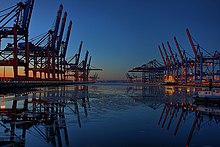


Hamburg is a major transportation hub, connected to four Autobahnen (motorways) and the most important railway junction on the route to Scandinavia.
Bridges and tunnels connect the northern and southern parts of the city, such as the old Elbe Tunnel (Alter Elbtunnel) or St. Pauli Elbtunnel (official name), which opened in 1911, today a major tourist sight, and the Elbe Tunnel (Elbtunnel), the crossing of a motorway.[148]
Hamburg Airport is the oldest airport in Germany still in operation.[149][150] There is also the smaller Hamburg Finkenwerder Airport, used only as a company airport for Airbus. Some airlines market Lübeck Airport in Lübeck as serving Hamburg.[151]
Hamburg's licence plate prefix was "HH" (Hansestadt Hamburg; English: Hanseatic City of Hamburg) between 1906 and 1945 and from 1956 onwards, rather than the single letter normally used for large cities since the federal registration reform in 1956, such as B for Berlin or M for Munich. "H" was Hamburg's prefix in the years between 1945 and 1947 (used by Hanover since 1956).[152]
Public transport[edit]

Public transport by rail, bus, and ship is organised by the Hamburger Verkehrsverbund ("Hamburg transit authority") (HVV). Tickets sold by one company are valid on all other HVV companies' services. The HVV was the first organisation of this kind worldwide.[153]
33 mass transit rail lines across the city are the backbone of public transport.[154] The S-Bahn (commuter train system) comprises six lines and the U-Bahn four lines – U-Bahn is short for Untergrundbahn (underground railway). Approximately 41 km (25 mi) of 101 km (63 mi) of the U-Bahn is underground; most is on embankments or viaduct or at ground level. Older residents still speak of the system as Hochbahn (elevated railway), also because the operating company of the subway is the Hamburger Hochbahn. The AKN railway connects satellite towns in Schleswig-Holstein to the city. On some routes regional trains of Germany's major railway company Deutsche Bahn AG and the regional metronom trains may be used with an HVV ticket. Regional trains stop at various stations within city limits such as the four larger stations, Hauptbahnhof, Dammtor, Altona, and Harburg, as well as Hamburg Hasselbrook and Hamburg Bergedorf. The tram system was opened in 1866 and shut down in 1978.[155]
Gaps in the rail network are filled by more than 669 bus routes, operated by single-deck two-, three- and four-axle diesel buses.[154] Hamburg has no trams or trolleybuses, but has hydrogen-fuelled buses. The buses run frequently during working hours, with buses on the MetroBus routes running every ten minutes from 6 am to 9 pm. On special weekday night lines the intervals can be 30 minutes or more, while on normal days (Monday-Friday) normal buses stop running at night (some lines run 24 hours a day, every day of the year at least every half hour).[156]
There are eight ferry lines along the River Elbe, operated by HADAG, that fall under the aegis of the HVV. While mainly used by citizens and dock workers, they can also be used for sightseeing tours.[157]

The international airport serving Hamburg, Hamburg Airport Helmut Schmidt (IATA: HAM, ICAO: EDDH), is the fifth biggest and oldest airport in Germany, having been established in 1912 and located about 5 miles (8 kilometres) from the city centre. About 60 airlines provide service to 125 destination airports, including some long-distance destinations like Newark, New Jersey on United Airlines, Dubai on Emirates, and Tehran on Iran Air. Hamburg is a secondary hub for Lufthansa, which is the largest carrier at the airport, and the airline also operates one of its biggest Lufthansa Technik maintenance facilities there. The second airport is located in Hamburg-Finkenwerder, officially named Hamburg Finkenwerder Airport (IATA: XFW, ICAO: EDHI). It is about 10 km (6 mi) from the city centre and is a nonpublic airport for the Airbus plant. It is the second biggest Airbus plant, after Toulouse, and the third biggest aviation manufacturing plant after Seattle and Toulouse; the plant houses the final assembly lines for A318, A319, A320, A321, and A380 aircraft.[158]
- Public transportation statistics
The average amount of time people spend commuting with public transit in Hamburg, for example to and from work, on a weekday is 58 min. 16% of public transit riders, ride for more than two hours every day. The average amount of time people wait at a stop or station for public transit is 11 min, while 11% of riders wait for over 20 minutes on average every day. The average distance people usually ride in a single trip with public transit is 8.9 km, while 21% travel for over 12 km in a single direction.[159]
Utilities[edit]
Electricity for Hamburg and Northern Germany is largely provided by Vattenfall Europe, formerly the state-owned Hamburgische Electricitäts-Werke. Vattenfall Europe used to operate the Brunsbüttel Nuclear Power Plant and Krümmel Nuclear Power Plant, both taken out of service as part of the nuclear power phase-out. In addition, E.ON operates the Brokdorf Nuclear Power Plant, near Hamburg. There are also the coal-fired Wedel, Tiefstack, and Moorburg CHP Plant, and the fuel-cell power plant in the HafenCity quarter. VERA Klärschlammverbrennung uses the biosolids of the Hamburg wastewater treatment plant; the Pumpspeicherwerk Geesthacht is a pump storage power plant and a solid waste combustion power station is Müllverwertung Borsigstraße.[160]
In June 2019, Hamburg introduced a law governing the phasing out of coal based thermal and electric energy production ("Kohleausstiegsgesetz").[161] This move was the result of negotiations between parliamentary parties and representatives of a campaign called Tschuess Kohle] ("Goodbye Coal"). In 2020, the city's Ministry for Environment and Energy announced a partnership with Namibia as a potential supplier of woody biomass, sourced through landscape maintenance in areas affected by woody plant encroachment, to replace coal.[162]
Sports[edit]
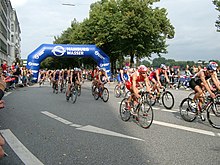
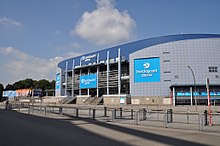

Hamburger SV is a football team playing in the 2. Bundesliga. HSV was six times German champion, three times winner of the German Cup, and triumphed in the European Cup in 1983, as well as having participated in the group stages of the Champions League twice: in 2000–01 and 2006–07. They play at the Volksparkstadion (average attendance in the 12–13 season was 52,916). The HSV was the oldest team of the Bundesliga, playing in the league since its beginning in 1963, until a change of results saw them relegated from the Bundesliga in 2018. In addition, FC St. Pauli is a second division football club that came in second place in the 2009–10 season and qualified to play alongside Hamburger SV in the first division for the first time since the 2001–02 season. St. Pauli's home games take place at the Millerntor-Stadion.
The Hamburg Freezers represented Hamburg until 2016 in the DEL, the premier ice hockey league in Germany.
HSV Handball represented Hamburg until 2016 in the German handball league. In 2007, HSV Handball won the European Cupwinners Cup. The Club won the league in the 2010–11 season and had an average attendance of 10.690 in the O2 World Hamburg the same year. The most recent success for the team was the EHF Champions League win in 2013. Since 2014, the club has suffered from economic problems and was almost not allowed the playing licence for the 2014–15 season; but due to economic support from the former club president/sponsor Andreas Rudolf, the club was allowed the licence in the last minute. On 20 January 2016, however, their licence was removed due to violations following the continued economic struggles. In 2016–17, they were not allowed to play in the first or second league. The team lives on through their former second team (now their main team) in the third division (2016–2018) and in second division (since 2018).
The BCJ Hamburg played in the Basketball Bundesliga from 1999 to 2001. Later, the Hamburg Towers became the city's prime team. The Towers promoted to Germany's top division in 2019. In 2022, they already reached the playoffs. The Towers play their home games at the Edel-optics.de Arena in Wilhelmsburg.
Hamburg is the nation's field hockey capital and dominates the men's as well as the women's Bundesliga. Hamburg hosts many top teams such as Uhlenhorster Hockey Club, Harvesterhuder Hockey Club, and Club An Der Alster.
The Hamburg Warriors are one of Germany's top lacrosse clubs.[163] The club has grown immensely in the last several years and includes at least one youth team, three men's, and two women's teams. The team participates in the Deutsch Lacrosse Verein. The Hamburg Warriors are part of the Harvestehuder Tennis- und Hockey-Club e.V (HTHC).[164]
Hamburg Blue Devils was one of the prominent American Football teams playing in German Football League before its exit in 2017.[165] Hamburg Sea Devils is a team of European League of Football (ELF), which is a planned professional league, that is set to become the first fully professional league in Europe since the demise of NFL Europe.[166] The Sea Devils will start playing games in June 2021.[167]
There are also the Hamburg Dockers, an Australian rules football club.[168] The FC St. Pauli team dominates women's rugby in Germany. Other first-league teams include VT Aurubis Hamburg (Volleyball) and Hamburger Polo Club.[169] Eimsbütteler TV plays in the German Women's 2 Volleyball Bundesliga. There are also several minority sports clubs, including four cricket clubs.

The Centre Court of the Tennis Am Rothenbaum venue, with a capacity of 13,200 ppeople, is the largest in Germany.[170]
Hamburg also hosts equestrian events at Reitstadion Klein Flottbek (Deutsches Derby in jumping and dressage) and Horner Rennbahn (Deutsches Derby flat racing).[171] The city also owns the harness racing track "Trabrennbahn Bahrenfeld". The Hamburg Marathon is the biggest marathon in Germany after Berlin's. In 2008, 23,230 participants were registered.[172] World Cup events in cycling, the UCI ProTour competition EuroEyes Cyclassics, and the triathlon ITU World Cup event Hamburg City Man are also held in here.[173]
Volksparkstadion was used as a site for the 2006 World Cup. In 2010 UEFA held the final of the UEFA Europa League in the arena.[174]
Hamburg made a bid for the 2024 Olympic Games, but 51.7 percent of those city residents participating in a referendum in November 2015 voted against continuing Hamburg's bid to host the games. Meanwhile, Hamburg's partner city Kiel voted in favour of hosting the event, with almost 66 percent of all participants supporting the bid. Opponents of the bid had argued that hosting the 33rd Olympic Games would cost the city too much in public funds.[175]
Education[edit]


The school system is managed by the Ministry of Schools and Vocational Training (Behörde für Schule und Berufsbildung). The system had approximately 191,148 students in 221 primary schools and 188 secondary schools in 2016.[176] There are 32 public libraries in Hamburg.[177]
Nineteen universities are located in Hamburg, with about 100,589 university students in total, including 9,000 resident students.[178] Six universities are public, including the largest, the University of Hamburg (Universität Hamburg) with the University Medical Center Hamburg-Eppendorf, the University of Music and Theatre, the Hamburg University of Applied Sciences, the HafenCity University Hamburg, and the Hamburg University of Technology. Seven universities are private, like the Bucerius Law School, the Kühne Logistics University, and the HSBA Hamburg School of Business Administration. The city has also smaller private colleges and universities, including many religious and special-purpose institutions, such as the Helmut Schmidt University (formerly the University of the Federal Armed Forces Hamburg).[179] Hamburg is home to one of the oldest international schools in Germany, the International School of Hamburg.
Twin towns – sister cities[edit]
 Saint Petersburg, Russia (1957)
Saint Petersburg, Russia (1957) Marseille, France (1958)
Marseille, France (1958) Shanghai, China (1986)
Shanghai, China (1986) Dresden, Germany (1987)
Dresden, Germany (1987) León, Nicaragua (1989)
León, Nicaragua (1989) Osaka, Japan (1989)
Osaka, Japan (1989) Prague, Czech Republic (1990)
Prague, Czech Republic (1990) Chicago, United States (1994)
Chicago, United States (1994) Dar Es Salaam, Tanzania (2010)
Dar Es Salaam, Tanzania (2010)
Notable people[edit]
In Hamburg it's hard to find a native Hamburger. A hurried and superficial search turns up only crayfish, people from Pinneberg, and those from Bergedorf. One accompanies the contented little kippers of a striving society; mackerels from Stade, sole from Finkenwerder, herrings from Cuxhaven swim in expectant throngs through the streets of my city and lobsters patrol the stock exchange with open claws.... The first so-called unguarded glance always lands on the bottom of the sea and falls into twilight of the aquarium. Heinrich Heine must have had the same experience when he tried, with his cultivated scorn and gifted melancholy, to find the people of Hamburg.



- Lucas Holstenius (1596–1661), German Catholic humanist, geographer, historian and librarian[182]
- Andreas Schlüter (c. 1659 – c. 1714), German baroque sculptor and architect[183]
- Barthold Heinrich Brockes (1680–1747), German poet[184]
- Hermann Samuel Reimarus (1694–1768), German philosopher and writer of the Enlightenment[185]
- Konrad Ekhof (1720–1778), the foremost German actor of the 18th century[186]
- Johann Bernhard Basedow (1724–1790), German educational reformer, teacher and writer[187]
- Meta Klopstock (1728–1758), writer[188]
- Abel Seyler (1730–1800), one of the foremost theatre principals of 18th century Europe, who made Hamburg a center of theatrical innovation[189]
- Marie Elizabeth de LaFite (1737–1794), German-born translator and author
- Johann Joachim Eschenburg (1743–1820), German critic and literary historian[190]
- Johann Elert Bode (1747–1826), astronomer. He named and determined the orbit of Uranus.[191]
- Johann Dominicus Fiorillo (1748–1821), German painter and historian of art[192]
- Christian, Count of Stolberg-Stolberg (1748–1821), poet, brother of Frederick Leopold[193]
- Friedrich Leopold Graf zu Stolberg-Stolberg (1750–1819), German lawyer and translator[194]
- Georg Friedrich von Martens (1756–1821), German jurist and diplomat[195]
- Ludwig Erdwin Seyler (1758–1836), banker and politician
- Johann Franz Encke (1791–1865), astronomer. He measured the distance from Earth to the Sun.[196]
- Ami Boué (1794–1881), geologist of French Huguenot origin[197]
- Gustav Friedrich Waagen (1794–1868), German art historian[198]
- Johann Christian Poggendorff (1796–1877), physicist. He dealt with electricity and magnetism.[199]
- Matthias Jakob Schleiden (1804–1881), German botanist, co-founder of cell theory[200]
- Samson Raphael Hirsch (1808–1888), Orthodox rabbi. He founded the Torah im Derech Eretz.[201]
- Felix Mendelssohn (1809–1847), German composer, pianist, organist and conductor[202]
- Ludwig Preller (1809–1861), German philologist and antiquarian[203]
- Friedrich Gerstäcker (1816–1872), German travel, writer and novelist[204]
- Justus Ludwig Adolf Roth (1818–1892), German geologist and mineralogist[205]
- Heinrich Barth (1821–1865), German explorer of Africa and a scholar[206]
- Jacob Bernays (1824–1881), German philologist and philosophical writer[207]
- Julius Oppert (1825–1905), French-German Assyriologist[208]
- Thérèse Tietjens (1831–1877), leading opera and oratorio soprano[209]
- Johannes Brahms (1833–1897), German composer, pianist and conductor[210]
- Michael Bernays (1834–1897), German literary historian, scholar of Goethe and Shakespeare[211]
- Wilhelm Rudolph Fittig (1835–1910), German chemist. He discovered the pinacol coupling reaction.[212]
- Wilhelm Kühne (1837–1900), German physiologist. He coined the word "enzyme" in 1878.[213]
- Carl Rosa (1842–1889), musical impresario. He founded the Carl Rosa Opera Company in London.[214]
- Carl Hagenbeck (1844–1913), a merchant of wild animals who supplied many European zoos[215]
- Hans Hinrich Wendt (1853–1928), German Protestant theologian[216]
- Hans von Bartels (1856–1913), German painter[217]
- Heinrich Hertz (1857–1894), physicist who first proved the existence of electromagnetic waves[218]
- Helmut Schmidt (1918–2015), politician and chancellor of West Germany from 1974 to 1982
- Marione Ingram (born 1935), Holocaust survivor, civil rights activist, author and artist.
- Angela Merkel (born 1954), retired politician and scientist, chancellor of Germany from 2005 to 2021
- Olaf Scholz (born 1958), politician, First Mayor of Hamburg from 2011 to 2018, and the current chancellor of Germany since 2021
- The Hamburg Cell's terrorists, committed the 9/11 attacks
See also[edit]
References[edit]
- ^ a b citypopulation.de quoting Federal Statistics Office. "Germany: Urban Areas". Archived from the original on 3 June 2020. Retrieved 6 January 2020.
- ^ Bevölkerung in Hamburg am 31.12.2022 (Auszählung aus dem Melderegister) (Hilfe dazu).
- ^ "Definition of HAMBURG". www.merriam-webster.com. Retrieved 6 March 2022.
- ^ "What are Hamburg people called? – SidmartinBio". www.sidmartinbio.org. Archived from the original on 6 March 2022. Retrieved 6 March 2022.
- ^ "Bruttoinlandsprodukt, Bruttowertschöpfung | Statistikportal.de". Statistische Ämter des Bundes und der Länder | Gemeinsames Statistikportal (in German). Retrieved 31 July 2023.
- ^ "Sub-national HDI – Area Database – Global Data Lab". hdi.globaldatalab.org. Retrieved 13 September 2018.
- ^ Krech, Eva Maria; Stock, Eberhard; Hirschfeld, Ursula; Anders, Lutz-Christian (2009), Deutsches Aussprachewörterbuch, Berlin, New York: Walter de Gruyter, p. 565, ISBN 978-3-11-018202-6
- ^ (German: Freie und Hansestadt Hamburg; Low Saxon: Friee un Hansestadt Hamborg)
- ^ a b Verfassung der Freien und Hansestadt Hamburg [Constitution of Hamburg] (in German) (11th ed.), 6 June 1952, archived from the original on 10 June 2007, retrieved 21 September 2008.
- ^ "Hamburg in Zahlen". hamburg.de (in German). Retrieved 12 July 2023.
- ^ "Quality of Living City Ranking". mercer.com. Mercer. Retrieved 19 May 2020.
- ^ Media release on the website of Hamburg Marketing, retrieved on 19 March 2016.
- ^ "Anzahl der Brücken in Städten Europas". Statista (in German). Retrieved 19 May 2020.
- ^ Schulz, Matthias (1 October 2010). "Mapping Ancient Germania: Berlin Researchers Crack the Ptolemy Code". Der Spiegel – via Spiegel Online.
- ^ Verg, Erich; Verg, Martin (2007), Das Abenteuer das Hamburg heißt (in German) (4th ed.), Hamburg: Ellert&Richter, p. 8, ISBN 978-3-8319-0137-1
- ^ Gretzschel, Sven Kummereincke und Matthias (24 January 2014). "Sensation: Wissenschaftler entdecken die Hammaburg". www.abendblatt.de (in German). Retrieved 20 December 2020.
- ^ "Hammaburg – der große Irrtum" (in German). Hamburg Abendblatt. 12 December 2007. Retrieved 30 September 2008.
- ^ a b Verg (2007), p.15
- ^ Snell, Melissa (2006), The Great Mortality, Historymedren.about.com, archived from the original on 10 March 2009, retrieved 19 April 2009
- ^ "Hamburg – Introduction – WTCF-Better City Life through Tourism". en.wtcf.org.cn. Retrieved 9 March 2020.
- ^ Verg (2007), p. 26
- ^ Verg (2007), p. 30
- ^ Clark, David S. (1987), "The Medieval Origins of Modern Legal Education: Between Church and State", The American Journal of Comparative Law, 35 (4), American Society of Comparative Law: 653–719, doi:10.2307/840129, JSTOR 840129
- ^ Verg (2007), p. 39
- ^ "The Matthiae meal". Deutsche Welle. EU Screen. 2003. Archived from the original on 12 February 2023. Retrieved 12 February 2023.
- ^ History of the area Archived 6 February 2013 at the Wayback Machine, accessed 3 November 2012
- ^ "World Port Ranking 2011" (PDF). American Association of Port Authorities. aapa-ports.org.
- ^ https://zensus2011.de/SharedDocs/Downloads/DE/Publikationen/Aufsaetze_Archiv/2015_12_NI_GWZ_endgueltig.pdf?__blob=publicationFile&v=4
- ^ "Gedenkstätte Konzentrationslager Neuengamme". Kz-gedenkstaette-neuengamme.de. Retrieved 14 September 2013.
- ^ Cf. 'Schreiben der Geheimen Staatspolizei – Staatspolizeileitstelle Hamburg – an den Oberfinanzpräsidenten, Vermögensverwaltungsstelle vom 1. Juni 1943', Staatsarchiv Hamburg, Bestand Oberfinanzpräsident, Arb. Sign. 31/1 A, here after: Vierhundert Jahre Juden in Hamburg: eine Ausstellung des Museums für Hamburgische Geschichte vom 8. November 1991 bis 29. März 1992, Ulrich Bauche (ed.), Hamburg: Dölling und Galitz, 1991, (Die Geschichte der Juden in Hamburg; vol. 1), p. 492, ISBN 3-926174-31-5
- ^ Ortwin Pelc, Kriegsende in Hamburg, Hamburg 2005
- ^ Hamburg Wadden Sea National Park Act Gesetz über den Nationalpark Hamburgisches Wattenmeer (in German), 9 April 1990, retrieved 26 February 2011
- ^ Geologisches Landesamt Hamburg (Hamburg State Geological Department) (2007), "Statistisches Jahrbuch 2007/2008", Statistisches Jahrbuch Hamburg (in German), Hamburg: Statistisches Amt für Hamburg und Schleswig-Holstein, ISSN 1614-8045
- ^ "Hamburg, Germany Köppen Climate Classification (Weatherbase)". Weatherbase. Retrieved 7 February 2019.
- ^ Report on the snowfall disaster of 1978/1979 in northern Germany, retrieved on 20 July 2016.
- ^ Article on the winters in Germany, retrieved on 20 July 2016.
- ^ Comparison Archived 7 October 2016 at the Wayback Machine of the weather and snowfall in German winters (from 1950 on), retrieved on 20 July 2016.
- ^ "World Weather Information Service – Hamburg". Deutscher Wetterdienst. Archived from the original on 3 March 2016. Retrieved 6 April 2012.
- ^ "World Meteorological Organization Climate Normals for 1991–2020". World Meteorological Organization Climatological Standard Normals (1991–2020). National Oceanic and Atmospheric Administration. Archived from the original on 12 October 2023. Retrieved 12 October 2023.
- ^ "Ausgabe der Klimadaten: Monatswerte". Archived from the original on 12 June 2014. Retrieved 24 June 2014.
- ^ "Hamburg, Germany – Detailed climate information and monthly weather forecast". Weather Atlas. Yu Media Group. Retrieved 2 July 2019.
- ^ "Ausländer in Hamburg nach Herkunftsländern 2021".
- ^ Hamburger Melderegister (PDF) (in German), Statistical office Hamburg and Schleswig-Holstein (Statistisches Amt für Hamburg und Schleswig-Holstein), 2016
- ^ Hamburg Metropolitan Area fact sheet (PDF), Office of Statistics for Hamburg and Schleswig-Holstein (Statistisches Amt für Hamburg und Schleswig-Holstein), retrieved 25 July 2017
- ^ Bevölkerung in Hamburg am 31.12.2016 statistik-nord.de (in German) Retrieved 27 June 2023
- ^ Bevölkerung mit Migrationshintergrund in den Hamburger Stadtteilen Ende 2016 statistik-nord.de (in German) Retrieved 27 June 2023
- ^ a b Statistisches Jahrbuch. Hamburg 2016 statistik-nord.de (in German) Retrieved 27 June 2023
- ^ Selectable data base: Source: Residents registration office, Regionalergebnisse (PDF) (in German), Statistical office Hamburg and Schleswig-Holstein, retrieved 25 July 2016
- ^ "Wie Portugiesen in Hamburg heimisch wurden". www.welt.de (in German). 16 November 2011. Retrieved 24 July 2023.
- ^ Afghan Migration to Germany: History and Current Debates, 5 April 2019
- ^ "Warum es viele Afghanen nach Hamburg zieht". www.welt.de (in German). 23 August 2021. Retrieved 24 July 2023.
- ^ "Welterbe Info Point Hamburg - All info on the UNESCO World Heritage Site". 16 June 2020.
- ^ Bausch, Karl-Heinz (2007), "Die deutsche Sprache—eine Dialektlandschaft", Nationalatlas Bundesrepublik Deutschland (PDF) (in German), Leipzig: Leibniz-Institut für Länderkunde, pp. 94–95, ISBN 978-3-8274-0947-8, archived from the original (PDF) on 19 July 2011, retrieved 24 September 2008
- ^ Several places are named ...brook (Billbrook, Brooktor, Grasbrook, Hammerbrook, Hellbrook, Iserbrook) rather than Standard German ...bruch (neutr.; =brook riverscape), Bullenhusen rather than Bullenhausen, Lohbrügge rather than Lohbrücke, several localities starting with Nien... (Niendorf, Nienstedten) rather than Neuen..., or ending ...hude (Dockenhuden, Harvestehude, Winterhude) rather than ...hut[ung] (fem.; =pasture), Uhlenhorst rather than Eulenhorst, several places and water bodies are named ...bek (Barmbek, Eilbek, Fischbek, Flottbek, Goldbek, Isebek, Kirchsteinbek, Langenbek, Osterbek, Pepermölenbek, Wandsbek) rather than ...bach, several places and water bodies are called ...fleet (Alsterfleet, Bleichenfleet, Moorfleet) rather than ...fließ (=brook, stream). Further toponyms with no close Standard German correspondents appear, such as ...büttel (=inhabited place; Eimsbüttel, Fuhlsbüttel, Hummelsbüttel, Poppenbüttel, Wellingsbüttel) or Twiete (=alley wedged between buildings). Like in other parts of Northern Germany ...stedt (Bergstedt, Billstedt, Duvenstedt, Eidelstedt, Lokstedt, Mellingstedt, Nienstedten, Ohlstedt, Rahlstedt) prevails over ...stadt (=town, originally simply stead).
- ^ Evangelische Kirche in Deutschland – Kirchemitgliederzahlen Stand 31. Dezember 2018 EKD, January 2020
- ^ Sonja Haug et al.: Muslimisches Leben in Deutschland, Nuremberg, 2009
- ^ "Kartenseite: Muslime in den Landkreisen beim Zensus 2011" (PDF). Archived from the original (PDF) on 23 August 2017. Retrieved 30 April 2017.
- ^ "Moschee in Hamburg". Hamburg.de. Retrieved 10 August 2021.
- ^ "Deutschlands älteste Moschee wurde 50". 19 June 2007. Retrieved 8 June 2014.
- ^ Zaklikowski, Dovid (30 August 2007), Jewish School Returns to Hamburg Building Left Judenrein by Nazis, chabad.org, retrieved 11 August 2008
- ^ "Hamburg - jewish heritage, history, synagogues, museums, areas and sites to visit". Retrieved 1 January 2024.
- ^ Kleiner Rathausführer (in German), Hamburg: State Chancellery, 2006
- ^ "German conservatives win most votes", USA Today, 24 February 2008, retrieved 13 August 2008
- ^ Kopp, Martin (2007), Geheime Absprachen zwischen CDU und Grünen (in German), Hamburg: Die Welt, archived from the original on 29 June 2009, retrieved 13 August 2008
- ^ Schwarz-Grün in Hamburg am Ende in Die Zeit – online, revisited on November, 28. 2010.
- ^ a b Borough Administration Act Bezirksverwaltungsgesetz (BezVG) (in German), 6 July 2006, archived from the original on 13 August 2007, retrieved 21 September 2008
- ^ Greater Hamburg Act Groß-Hamburg-Gesetz (in German), 26 January 1937, archived from the original on 17 January 2018, retrieved 24 September 2008
- ^ Reich Act of the Constitution and Administration of Hanseatic city of Hamburg Reichsgesetz über die Verfassung und Verwaltung der Hansestadt Hamburg (in German), 9 December 1937, archived from the original on 27 December 2008, retrieved 24 September 2008
- ^ a b c d e f g h "Gesetz über die räumliche Gliederung der Freien und Hansestadt Hamburg (RäumGiG)" [Hamburg Act of Areal Organization] (in German). 6 July 2006. Retrieved 26 November 2022.
- ^ Gebietsreform Bezirke, Stadtportal hamburg.de. Retrieved 26 November 2022.
- ^ Hamburg – Grüne Metropole am Wasser (in German), Hamburg: Behörde für Stadtentwicklung und Umwelt, 1 July 2007, retrieved 24 September 2008
- ^ "Hamburg: Germany's Window to the World". EuropeUpClose.com. 18 April 2012. Retrieved 12 March 2013.
- ^ Buba, Eike Manfred (1998), Auf dem Rathausmarkt (in German), Hamburg website, archived from the original on 10 October 2008, retrieved 13 August 2008
- ^ Facts & figures Tunes: HafenCity, ArchNewsNow.com, 19 July 2022, retrieved 23 August 2008
- ^ River Tunes: Elbe Philharmonic Hall by Herzog & de Meuron, ArchNewsNow.com, 5 April 2007, retrieved 23 August 2008
- ^ Jaeger, Falk (May 2008), Waterfront Living and Working: Hamburg's HafenCity, Goethe-Institut, archived from the original on 2 June 2008, retrieved 23 August 2008
- ^ Bettine Menke, Wolfgang Struck (2022), Theatermaschinen – Maschinentheater: Von Mechaniken, Machinationen und Spektakeln (pp. 96–97), transcript Verlag
- ^ "Clubstudie 2021: Initiative Musik legt Einzelauswertungen der Bundesländer vor" [Club Study 2021: Initiative Musik presents individual evaluations of the German federal states]. Faze Magazin (in German). 20 September 2021. Retrieved 6 January 2022.
- ^ "Clubstudie 2021: Einzelauswertungen der Bundesländer" [Club Study 2021: Individual evaluations of the German federal states]. Initiative Musik (in German). 20 September 2021. Archived from the original on 3 January 2022. Retrieved 6 January 2022.
- ^ Institut für Kultur- und Medienmanagement (August 2006), Kulturwirtschaftsbericht 2006 (PDF) (in German), Hamburg: Behörde für Kultur, Sport und Medien, archived from the original (PDF) on 9 November 2008, retrieved 13 August 2008
- ^ "2. Kreativwirtschaftsbericht für Hamburg" [2nd Creative Industries Report for Hamburg]. Hamburg Kreativ Gesellschaft (in German). December 2016. Retrieved 6 January 2022.
- ^ Kulturstiftung des Bundes, Bayreuth Was Yesterday – New Opera at Kampnagel, archived from the original on 28 June 2012, retrieved 13 August 2008
- ^ "Museums in Hamburg". Retrieved 29 December 2009.
- ^ Transcript of the John Tusa Interview with Gyorgy Ligeti, BBC, 1999, archived from the original on 20 July 2012, retrieved 24 September 2008
- ^ Alfred Schnittke, Boosey & Hawkes, retrieved 24 September 2008
- ^ "Presse- und Öffentlichkeitsarbeit". 10 May 2021. Retrieved 27 June 2023.
- ^ "Elektronische Musik – Vom Kult am Mischpult". Hamburg Tourismus.
- ^ Rivadavia, Eduardo, allmusic (((Helloween> Biography ))), allmusic, retrieved 24 September 2008
- ^ "Hamburg – die pulsierende Hip-Hop Metropole – Hamburg Marketing". marketing.hamburg.de.
- ^ Spirit Zone Recordings, discogs.com, retrieved 24 September 2008
- ^ "Hamburg Pride" (in German). Retrieved 5 October 2008.
- ^ "Alstervergnügen Hamburg" (in German). Retrieved 5 October 2008.
- ^ "Wann ist DOM" (in German). Retrieved 5 October 2008.
- ^ "Hafengeburtstag Hamburg". 4 January 2024. Retrieved 4 January 2024.
- ^ "Zehntausende Biker und ein schwerer Unfall". Spiegel Online (in German). 13 July 2008. Retrieved 5 October 2008.
- ^ "Weihnachtsmärkte in Hamburg-Mitte 2008" (in German). Bezirk Hamburg-Mitte. Archived from the original on 18 September 2009. Retrieved 30 September 2008.
- ^ "Lange Nacht der Museen" (in German). Retrieved 5 October 2008.
- ^ "6. Festival der Kulturen Hamburg". Archived from the original on 13 June 2002. Retrieved 5 October 2008.
- ^ "Filmfest Hamburg". Archived from the original on 21 November 2008. Retrieved 5 October 2008.
- ^ "Welcoming the world". Archived from the original on 1 December 2005. Retrieved 5 October 2008.
- ^ "Mandago, Timofeyeva impress at Hamburg Marathon". 27 April 2008. Archived from the original on 20 October 2012. Retrieved 5 October 2008.
- ^ "Standpunktepapier Musikstadt Hamburg" (PDF). Handelskammer Hamburg. 2014. pp. 35–36. Archived from the original (PDF) on 20 April 2021. Retrieved 20 April 2021.
- ^ "Dockville". Retrieved 19 June 2009.
- ^ "Über uns – Reeperbahn Festival". Über Uns.
- ^ "Überjazz – Jazzfestival auf Kampnagel | Hamburg Tourismus". www.hamburg-tourism.de.
- ^ Birnen, Bohnen, Speck – Schmeckt vorzüglich (in German), Hamburger Abendblatt, 5 July 2002, retrieved 11 August 2008
- ^ Aalsuppe – Frage des Geschmacks (in German), Hamburger Abendblatt, 25 June 2002, retrieved 11 August 2008
- ^ Maischollen – Zart gebraten (in German), Hamburger Abendblatt, 25 June 2002, retrieved 11 August 2008
- ^ Grütze – Mit kalter Milch (in German), Hamburger Abendbla, 25 June 2002, retrieved 11 August 2008
- ^ Labskaus – Essen der Matrosen (in German), Hamburger Abendblatt, 25 June 2002, retrieved 11 August 2008
- ^ Alsterwasser – Bier und Limonade (in German), Hamburger Abendblatt, 10 August 2002, retrieved 11 August 2008
- ^ Rundstück – Hamburger Brötchen (in German), Hamburger Abendblatt, 5 August 2002, retrieved 6 June 2008
- ^ Stradley, Linda (2004), History of Hamburgers, retrieved 23 August 2008
- ^ Weßling, Kathrin (30 April 2016). "1. Mai-Demo in Hamburg: Was soll der Krawall auf der Schanze noch?". Der Spiegel. spiegel.de. Retrieved 9 February 2017.
- ^ "Raid of "Krawalle beim G20-Gipfel – Randalierer setzen Autos in Brand". Der Spiegel. spiegel.de. 7 July 2017. Retrieved 11 July 2017.
- ^ "Krawalle in Hamburg beim G20-Gipfel – Rote Flora distanziert sich von Gewaltausbrüchen". rp-online.de. 8 July 2017. Retrieved 11 July 2017.
- ^ "Website of the Anglo-German Club". Retrieved 15 December 2015.
- ^ "Britain in Hamburg". ning.com. Archived from the original on 18 July 2011. Retrieved 13 September 2009.
- ^ "Anglo-Hanseatic Lodge 850". gl-bfg.com. Archived from the original on 28 April 2016. Retrieved 14 September 2015.
- ^ "Grand Lodge of British Freemasons in Germany". gl-bfg.com. Retrieved 14 September 2015.
- ^ "United Grand Lodges of Germany". freimaurer.org. Retrieved 14 September 2015.
- ^ "The Anglican Church of St Thomas Becket – A welcoming, active and inclusive church, growing in our relationship with God and the wider community". anglican-church-hamburg.de.
- ^ "Website of the American Club of Hamburg". Retrieved 13 September 2009.
- ^ "Website of the American Women's Club of Hamburg". Retrieved 13 April 2014.
- ^ Hamburg Führer Verlag GmbH: Hamburg Guide, May 2009, p. 61
- ^ Germany, AmCham. "American Chamber of Commerce in Germany". amcham.de.
- ^ Journals of Dorothy Wordsworth, Macmillan 1959.
- ^ . Encyclopædia Britannica. Vol. 16 (11th ed.). 1911. p. 719.
- ^ Behling, Heidburg; Garbe, Detlef (January 2009), "Die Orte bleibe", Mittelungen des Freundeskreises KZ-Gedenkstätte Neuengamme (in German), no. 11, p. 3
- ^ "Regional GDP per capita ranged from 30% to 263% of the EU average in 2018". Eurostat.
- ^ gral. "Der Medianlohn in Hamburg ist fast 10 % höher als in Westdeutschland. | Elbe Wochenblatt" (in German). Archived from the original on 28 August 2022. Retrieved 28 August 2022.
- ^ "Arbeitslosenquote nach Bundesländern in Deutschland 2018 | Statista". Statista (in German). Retrieved 13 November 2018.
- ^ (Destatis), Statistisches Bundesamt (13 November 2018). "Federal Statistical Office Germany – GENESIS-Online". www-genesis.destatis.de. Retrieved 13 November 2018.
- ^ "Welcome to the Port of Hamburg". The official website of the Port of Hamburg. Retrieved 1 November 2017.
- ^ M. Ramesh: M. Ramesh (25 December 2000). "Making Hamburg Europe's preferred port". Hinduonnet.com. Archived from the original on 20 July 2009. Retrieved 11 August 2008.
- ^ *ArcelorMittal Website / Hamburg, retrieved 26 February 2011[permanent dead link]
- Trimet Website / Hamburg, archived from the original on 19 July 2011, retrieved 26 February 2011
- Aurubis Website / Hamburg, archived from the original on 8 March 2011, retrieved 26 February 2011
- Blohm + Voss Website / Hamburg, archived from the original on 28 March 2012, retrieved 26 February 2011
- ^ Past Cost-Cutting and Layoffs Haunt Airbus in Germany, Spiegel Online, 28 July 2006, retrieved 11 August 2008
- ^ "Tourismus in Hamburg 2017 [in German]" (PDF). Statistik informiert ... 21 February 2018. Retrieved 20 January 2019.
- ^ Umsatzbringer und Jobmotor Tourismus (in German), Behörde für Kultur, Sport und Medien, 11 July 2008, archived from the original on 9 August 2010, retrieved 13 August 2008
- ^ Rene S. Ebersole (November 2001). "The New Zoo". Audubon Magazine. National Audubon Society. Archived from the original on 6 September 2007. Retrieved 1 October 2008.
- ^ a b c "Tourismus in Hamburg im Dezember und im gesamten Jahr 2016 – Statistikamt Nord". www.statistik-nord.de (in German). Retrieved 1 November 2017.
- ^ "Hamburg wird heimlicher Heimathafen der Queen Mary 2" (in English: Hamburg nearly a home port for Queen Mary 2). In: Hamburger Abendblatt from 15 January 2010, p. 13
- ^ Von der Faszination, in Hamburg zu arbeiten (in German), hamburg.de, archived from the original on 9 March 2012, retrieved 6 August 2008
- ^ "Standpunktepapier Musikstadt Hamburg" (PDF). Handelskammer Hamburg. 2014. pp. 20–22. Archived from the original (PDF) on 20 April 2021. Retrieved 20 April 2021.
- ^ "Backbeat filming locations". movielocations.com. Archived from the original on 29 August 2008. Retrieved 1 October 2008.
- ^ Krankenhausplan 2020 der Freien und Hansestadt Hamburg (Hospital plan of Hamburg) (PDF) (in German), 1 January 2016, archived from the original (PDF) on 19 October 2016, retrieved 1 November 2017
- ^ Statistik Nord (statistics for Northern Germany) (in German), June 2011, archived from the original on 17 June 2008, retrieved 30 August 2012
- ^ Elbe ohne e – Buchstaben fallen weg (in German), Hamburger Abendblatt, 10 August 2002, retrieved 11 August 2008
- ^ Handelskammer Hamburg – Hamburg Airport: Facts, figures, and the Chamber's viewpoint, Handelskammer Hamburg (Hamburg chamber of commerce), 28 March 2008, archived from the original on 9 June 2007, retrieved 25 September 2008
- ^ Press release (8 January 2001), The airport celebrates its 90th anniversary, Hamburg Airport, retrieved 25 September 2008[permanent dead link]
- ^ Hamburg Lübeck Airport Guide, travel-library.com, archived from the original on 15 September 2008, retrieved 27 September 2008
- ^ other prefixes used between 1945 and 1956 were "MGH" (Military Government, Hamburg: 1945 only), "HG" (1947 only) and "BH" (British Zone, Hamburg) between 1948 and 1956.
- ^ HVV – Mehr als ein Ziel – Historie (in German), Hamburger Verkehrsverbund, retrieved 25 September 2008
- ^ a b "Zahlen | HVV-Verbundbericht". www.hvv-verbundbericht.de. Retrieved 1 November 2017.
- ^ Tramway & Light Railway Atlas – Germany 1996. London: Light Rail Transit Association. 1995. p. 262. ISBN 0-948106-18-2.
- ^ "Bus Hamburg". hamburg.de (in German). Retrieved 30 September 2023.
- ^ "Zahlen | HVV-Verbundbericht". www.hvv-verbundbericht.de. Retrieved 1 November 2017.
- ^ Airbus in Germany, Airbus, archived from the original on 23 January 2012, retrieved 27 January 2012
- ^ "Hamburg Public Transportation Statistics". Global Public Transit Index by Moovit. Retrieved 19 June 2017.
 Material was copied from this source, which is available under a Creative Commons Attribution 4.0 International License.
Material was copied from this source, which is available under a Creative Commons Attribution 4.0 International License.
- ^ MVB, MVB, 30 June 2017, retrieved 30 June 2017
- ^ "Kohleausstieg für die Hamburger Fernwärme". Hamburgische Bürgerschaft (in German). 25 June 2019. Archived from the original on 13 June 2020. Retrieved 13 June 2020.
- ^ "Klimapartnerschaft – Hamburg und Namibia prüfen nachhaltige Verwertung von Biomasse". Stadtportal Hansestadt Hamburg (in German). 12 May 2020. Retrieved 12 June 2020.
- ^ "HTHC Hamburg Warriors". Hamburgwarriors.com. Retrieved 25 January 2010.
- ^ Forman, Ross (10 June 2008), Out lacrosse coach lands in Germany, Outsports.com, archived from the original on 4 June 2008, retrieved 11 August 2008
- ^ Hamburg Blue Devils ziehen sich zuruck Archived 26 February 2014 at the Wayback Machine (in German) GFL website, published: 18 January 2014, accessed: 14 May 2014
- ^ "Football-Comeback des Jahres: Hamburg Sea Devils und Frankfurt Galaxy starten in der ELF". ran.de (in German). 9 March 2021. Retrieved 9 March 2021.[permanent dead link]
- ^ "Neues Hamburger Footballteam spielt im Stadion Hoheluft" (in German). Hamburger Abendblatt. 17 February 2021. Retrieved 17 February 2021.
- ^ Australian Football im Stadtpark (in German), Hamburger Abendblatt, 18 July 2005, retrieved 11 August 2008
- ^ Hamburg Blue Devils vor Einzug in die Play-offs (in German), Hamburger Abendblatt, 11 August 2008, retrieved 11 August 2008
- ^ Center Court / Rothenbaum Stadion (in German), Deutscher Tennis Bund, archived from the original on 1 February 2009, retrieved 16 August 2008
- ^ Shinar, Jack (9 July 2008), Kamsin Easily Wins Deutsches Derby, news.bloodhorse.com, archived from the original on 9 July 2008, retrieved 11 August 2008
- ^ Mandago, Timofeyeva impress at Hamburg Marathon, IAAF, 27 April 2008, archived from the original on 20 October 2012, retrieved 11 August 2008
- ^ Hamburg City Man 2006 als WM-Generalprobe (in German), Hamburger Abendblatt, 2 February 2008, retrieved 11 August 2008
- ^ Bilal, Ahmed (29 March 2008), 2010 Champions League Final in Madrid, 2010 UEFA Cup final in Hamburg, Soccerlens.com, retrieved 11 August 2008
- ^ "ZEIT ONLINE | Lesen Sie zeit.de mit Werbung oder im PUR-Abo. Sie haben die Wahl". www.zeit.de. Archived from the original on 19 May 2022. Retrieved 19 May 2022.
- ^ "Wie viele Schulen gibt es?". hamburg.de (in German). Retrieved 1 November 2017.
- ^ Wir über uns (Hamburg Libraries about us) (in German), Bücherhallen Hamburg, archived from the original on 29 June 2017, retrieved 1 November 2017
- ^ Hamburg, Hamburger Abendblatt -. "Hamburg hat so viele Studenten wie nie zuvor" (in German). Retrieved 1 November 2017.
- ^ Science Portal Hamburg (in German), Ministry of Science and Research (Behörde für Wissenschaft und Forschung), archived from the original on 10 August 2008, retrieved 5 August 2008
- ^ "Partnerstädte". hamburg.de (in German). Hamburg. Retrieved 12 February 2021.
- ^ Jenkins, Jennifer (2003), Provincial modernity: local culture and liberal politics in fin-de-siècle Hamburg, Cornell University Press, ISBN 0-8014-4025-4
- ^ . Encyclopædia Britannica. Vol. 13 (11th ed.). 1911. p. 619.
- ^ . Encyclopædia Britannica. Vol. 24 (11th ed.). 1911. p. 343.
- ^ . Encyclopædia Britannica. Vol. 4 (11th ed.). 1911. p. 624.
- ^ . Encyclopædia Britannica. Vol. 23 (11th ed.). 1911. p. 53.
- ^ . Encyclopædia Britannica. Vol. 9 (11th ed.). 1911. pp. 139–140.
- ^ . Encyclopædia Britannica. Vol. 3 (11th ed.). 1911. pp. 461–462.
- ^ Wilson, K.M. (1991). An Encyclopedia of Continental Women Writers. Garland Pub. p. 641. ISBN 978-0-8240-8547-6. Retrieved 3 March 2023.
- ^ Andrea Heinz: "Seyler, Abel." In: Neue Deutsche Biographie (NDB). Vol. 24, Duncker & Humblot, Berlin 2010, ISBN 978-3-428-11205-0, p. 300.
- ^ . Encyclopædia Britannica. Vol. 9 (11th ed.). 1911. p. 764.
- ^ . Encyclopædia Britannica. Vol. 4 (11th ed.). 1911. p. 108.
- ^ . Encyclopædia Britannica. Vol. 10 (11th ed.). 1911. p. 394.
- ^ . Encyclopædia Britannica. Vol. 25 (11th ed.). 1911. p. 953;see para 2.
Stolberg's brother, Christian, Graf zu Stolberg (1748–1821).....
- ^ . Encyclopædia Britannica. Vol. 25 (11th ed.). 1911. p. 953.
- ^ . Encyclopædia Britannica. Vol. 17 (11th ed.). 1911. pp. 786–787.
- ^ Clerke, Agnes Mary (1911). . Encyclopædia Britannica. Vol. 9 (11th ed.). p. 369.
- ^ . Encyclopædia Britannica. Vol. 4 (11th ed.). 1911. p. 315.
- ^ . Encyclopædia Britannica. Vol. 28 (11th ed.). 1911. pp. 223–224.
- ^ . Encyclopædia Britannica. Vol. 21 (11th ed.). 1911. p. 890.
- ^ . Encyclopædia Britannica. Vol. 24 (11th ed.). 1911. p. 330.
- ^ Abrahams, Israel (1911). . Encyclopædia Britannica. Vol. 13 (11th ed.). p. 525.
- ^ Rockstro, William Smyth; Tovey, Donald Francis (1911). . Encyclopædia Britannica. Vol. 18 (11th ed.). pp. 123–124.
- ^ . Encyclopædia Britannica. Vol. 22 (11th ed.). 1911. p. 278.
- ^ . Encyclopædia Britannica. Vol. 11 (11th ed.). 1911. pp. 906–907.
- ^ . Encyclopædia Britannica. Vol. 23 (11th ed.). 1911. p. 756.
- ^ . Encyclopædia Britannica. Vol. 3 (11th ed.). 1911. p. 447.
- ^ . Encyclopædia Britannica. Vol. 3 (11th ed.). 1911. p. 800.
- ^ . Encyclopædia Britannica. Vol. 20 (11th ed.). 1911. p. 140.
- ^ . Encyclopædia Britannica. Vol. 26 (11th ed.). 1911. p. 966.
- ^ Maitland, John Alexander Fuller (1911). . Encyclopædia Britannica. Vol. 4 (11th ed.). pp. 389–390.
- ^ . Encyclopædia Britannica. Vol. 3 (11th ed.). 1911. p. 800; see para 2.
His brother, Michael Bernays (1834–1897).....
- ^ . Encyclopædia Britannica. Vol. 10 (11th ed.). 1911. p. 440.
- ^ . Encyclopædia Britannica. Vol. 15 (11th ed.). 1911. p. 942.
- ^ . Encyclopædia Britannica. Vol. 23 (11th ed.). 1911. p. 720.
- ^ . Encyclopædia Britannica. Vol. 12 (11th ed.). 1911. p. 814.
- ^ . Encyclopædia Britannica. Vol. 28 (11th ed.). 1911. p. 518.
- ^ . Encyclopædia Britannica. Vol. 3 (11th ed.). 1911. p. 447.
- ^ . Encyclopædia Britannica. Vol. 13 (11th ed.). 1911. pp. 400–401.
External links[edit]
- Official website
- Hamburg at Curlie
 Geographic data related to Hamburg at OpenStreetMap
Geographic data related to Hamburg at OpenStreetMap- Chisholm, Hugh, ed. (1911). . Encyclopædia Britannica (11th ed.). Cambridge University Press.
- Hamburg panorama view
- Hamburg
- City-states
- German state capitals
- Free imperial cities
- Members of the Hanseatic League
- NUTS 2 statistical regions of the European Union
- Port cities and towns in Germany
- Port cities and towns of the North Sea
- Populated places established in the 9th century
- States of the German Confederation
- States of the German Empire
- States of the North German Confederation
- States of the Weimar Republic
- Populated riverside places in Germany
- Populated places on the Elbe
- Hanseatic Cities
- States of Germany
- NUTS 3 statistical regions of the European Union







